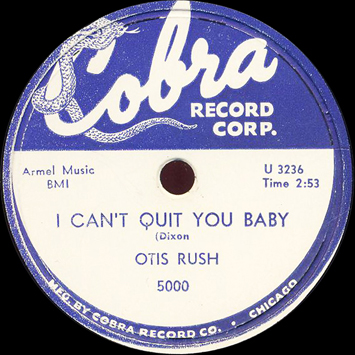

Revision note: Further research in Cash Box (now that most issues are available at the American Radio History website, and just a few pages are missing) has enabled us to lock down the release dates for Cobra 5000 through 5013, and the approximate date of the company's move to 3346 West Roosevelt (March 1957). We have provided details on most of the P-Vine Special LP and P-Vine CD reissues of Cobra and Artistic material, though a few continue to elude us. We're still definitely not clear which takes were used on some of the reissues. A little has been added about the fate of the Cobra and Artistic tapes after the company went out of business.
Cobra was founded in August 1956 by Elias P. Toscano (1924-1967) and Howard Bedno (1919-2006). The story goes that Willie Dixon brought Otis Rush, a blues singer and guitarist who had just been turned down by Chess, to their attention. Dixon, in turn, was feeling restricted by his relationship with the Chess and Checker labels and looking for more sessions to produce. Exactly how Toscano left his previous partnership, with Joe Brown in Abco, and moved to this new one has never been made entirely clear. A surviving tape box (number 3) from the July 11, 1956 session at Boulevard Studio, containing multiple takes of U3239 and one of U3240, identifies Abco as the client.
With a lifetime of a little more than than 3 years (trim it to 2 1/2, where active recording is concerned), Cobra did not leave a whole lot of documentation behind. Labeling on tape boxes was minimal, sometimes alternate takes were preserved and sometimes not, and for the sessions done in Toscano's own studio (where he also usually served as the engineer) no logs were kept. However, the two matrix series (in the U3200s for the first two sessions, at Boulevard, and in the C1000s from then on) were relentlessly regular and completely gap-free. The C1000 series was pegged to planned releases, but this has not seriously impeded grouping together what came from the same recording session. The release series on Cobra, and later on its short-lived satellite, Artistic, were also relentlessly regular. For session personnel, the recollections of the musicians and the inferences of listeners have had to suffice. However, Willie Dixon had a regular pool of studio musicians to draw on, from mid-1956 through mid-1958. For the remainder of the company's recording activity Dixon and drummer Odie Payne worked with Ike Turner and regular members of Turner's working band.
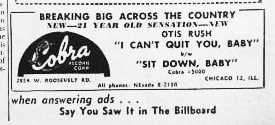
Equally famed for his brilliant left-handed guitar technique and his powerful tenor voice, Otis Rush was the first artist to record for Cobra—and it was his hit record that enabled the label to keep going. Otis Rush was born in Philadelphia, Mississippi, on April 29, 1935. His family moved to Chicago in 1948, and before his first Cobra session he was already an active performer in South Side and West Side clubs. Supposedly Chess didn't want him because he sounded too much like Muddy Waters! Willie Dixon knew better.
Otis Rush (eg, voc); Walter Horton (hca); Harold Ashby (ts); Lafayette Leake (p); Wayne Bennett (eg); Willie Dixon (b); Alrook "Al" Duncan (d).
Boulevard Studio, Chicago, July 11, 1956
| U 3236 | I Can't Quit You Baby (Dixon) | Cobra 5000, Chief 8000, Bluestown 777, Flyright [Br] FLY 562, P-Vine Special [J] PLP-9012, Flyright [Br] FLYCD01, P-Vine [J] PCD-2128, Paula PCD01, P-Vine [J] PCD 2346, Capricorn 9-42012 [CD], P-Vine [J] PCD-24038, Fuel 2000 302 061 077 [CD], Fuel 2000 302 061 138 [CD], P-Vine [J] PCD 18528, Fuel 2000 302 061 934 [CD], One Day DAY2CD204 | |
| U3236 tk. 1 | I Can't Quit You Baby | Blue Horizon [Br] 7-63222, Epic ECPJ-19, Flyright [Br] FLY 560, P-Vine Special [J] PLP-9013, P-Vine [J] PCD-2128, Capricorn 9-42012 [CD], P-Vine [J] PCD-24038 | |
| U3236 tk. 2 | I Can't Quit You Baby | P-Vine Special [J] PLP-9013, Flyright [Br] FLY 594, P-Vine [J] PCD-2128, Capricorn 9-42012 [CD], P-Vine [J] PCD-24038, Fuel 2000 302 061 077 [CD] | |
| U 3237 | Sit Down Baby ("Bedno") | Cobra 5000, Chief 8000, Bluestown 777, Negro Art [F] M-12-SB-367, Blue Horizon [Br] 7-63222, Epic ECPJ-19, Flyright [Br] FLY 560, P-Vine Special [J] PLP-9012, Flyright [Br] FLYCD01, P-Vine [J] PCD-2128, Paula PCD01, Capricorn 9-42012 [CD], P-Vine [J] PCD-24038, P-Vine [J] PCD 18528 | |
| U3237 [alt.] | Sit Down Baby | P-Vine Special [J] PLP-9013, Flyright [Br] FLY 562, Flyright [Br] FLYCD 18, Paula PCD-9, P-Vine [J] PCD-24038, Fuel 2000 302 061 077 [CD] | |
| U3237 [alt. 2] | Little Red Rooster [Sit Down Baby] | Flyright [Br] FLY 562, Flyright [Br] FLYCD01, P-Vine [J] PCD-2128, Paula PCD01 |
The matrix series that Cobra used in the early going is a continuation of the same series, out of Universal Recording, that Abco had been using. However, Howard Bedno, when interviewed for the Capricorn box (CD 9-40212), recalled attending the initial sessions at Boulevard Studio. Bedno mixed some Abco and Cobra events up in his recollections, but he said he attended nearly all Cobra sessions and the first one ought to have stuck in his mind.
The recording date is on a sheet from Boulevard Studios listing the takes of U3239 plus the first, rejected take of U3240 (see Cob2 and Cob3 below). The company's name, interestingly, is given as Abco. Exactly what led to Howard Bedno's entry and Joe Brown's exit remains unclear, but Brown apparently was still there when the session took place.
Although not a single Abco headliner would record for Cobra as a headliner, probably every instrumentalist on this session except Otis Rush had played on Abco sessions.
Cobra 5000 was released in the middle of August 1956. In Cash Box, which had given heavy coverage to the first five Abco releases, Cobra 5000 was advertised on August 25, 1956 (p. 33). In that same issue, Paul Glass of All-State Distributors said it had been his top seller the previous week (p. 28). The same ad ran on September 1 (p. 35). Cobra 5000 was first advertised in Billboard on September 8, 1956. Cash Box reviewed it on September 8, 1956 (p. 32). Further ads ran in Cash Box on September 8 (p. 33), September 15 (p. 29), September 22 (p. 31), September 29 (p. 34), October 6 (p. 36), October 13 (p. 42), October 20 (p. 21), November 3 (p. 33), November 10 (p. 29), November 17 (p. 37), November 24 (p. 35), and December 1, 1956 (p. 35).
On October 13 (p. 46), Cash Box had Eli Toscano on the road promoting the single. Sales of Cobra 5000 allowed the company to build a real distribution network. Cobra really depended on its very first release being a hit, though the hit was not nearly so huge and the downward path would not be nearly so steep for Toscano's label as it had been for Vitacoustic.
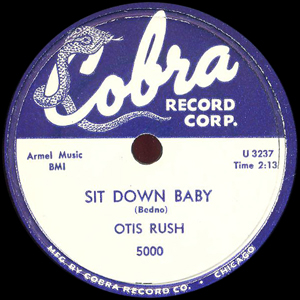
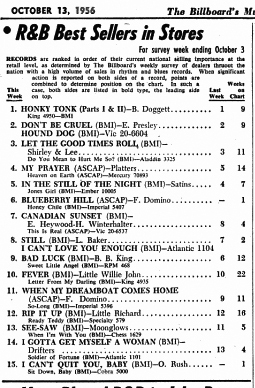
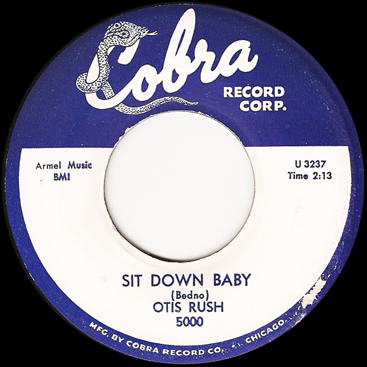
Negro Art M-12-SB-367, Story of the Blues: Chicago Blues 3, was an LP released in France around 1968. The first LP reissue devoted to Otis Rush's Cobra tracks was in Britain on Blue Horizon 7-63222, This One's a Good Un, in the late 1960s. Epic ECPJ-19 was a straight Japanese reissue of the Blue Horizon, using the same cover and title. Flyright FLY 560, a British release from 1980 under the title Groaning the Blues: Original Cobra Recordings 1956-1958, had the exact same track lineup as the Blue Horizon. P-Vine Special PLP-9012 was the Japanese counterpart to Flyright 560, under the title Groanin' the Blues. P-Vine Special PLP-9013 was released in Japan in 1980, under the title Otis Rush: Cobra Alternates. Flyright FLYCD01, Otis Rush: I Can't Quit You Baby, was released in Britain in 1989; its American counterpart, Otis Rush 1956-1958, was released as Paula PCD01, probably in 1990. (Both include an alternate take of "I Can't Quit You Baby"—we are not sure which one.) P-Vine PCD-2128, Otis Rush: The Cobra Sessions 1956-1958, was released in Japan in 1989. Chicago Boss Guitars: Otis Rush, Buddy Guy, Magic Sam is a compilation released on Flyright FLYCD 18 in 1991 and on Paula PCD-9 is its American counterpart from that same year (These include the other alternate take of "I Can't Quit You Baby"—again, we're not sure which one). P-Vine PCD 2346 was released in Japan in 1992 under title Willie Dixon: Working on the Blues, Vol. 1. P-Vine PCD-24038, Otis Rush: I Can't Quit You Baby—The Cobra Sessions 1956-1958, assembles Rush's 16 released sides and 11 of his alternate takes on one CD; it was released in Japan in 2001. Fuel 2000 302 061 077, The Essential Otis Rush: Classic Cobra Recordings 1956-1958, is a CD released in the United States in 2001; it presents the 16 released sides and 8 alternate takes. The Fuel 2000 package claims to use "take 3" as its alternate for "I Can't Quit You Baby." Fuel 2000 302 061 168, Wille Dixon: Mr. Dixon's Workshop, was released in the US on CD in 2001; it collects tracks supervised by Willie Dixon for Cobra, Chief, USA, and Jewel; 10 out of 18 were done for Cobra or Artistic.
Harmonica player Walter Horton was a couple of years older than Howard Bedno. Born in Horn Lake, Mississippi, on April 6, 1917, Horton learned the harmonica at age 5 and by his teenage years was an itinerant blues musician based in Memphis, Tennessee. He made his first recordings backing Little Buddy Doyle on 1939 sessions for Vocalion/OKeh. After working outside of music during the 1940s, he recorded for Sam Phillips' Sun label in 1952, cut one session for Chess as a member of Muddy Waters' band (January 1953), accompanied Johnny Shines on a classic session for JOB that same year, and made an outstanding record for States in 1954. In 1956 he had been doing session work for Chess (most notably his solo on "Walking by Myself" by Jimmy Rogers) and Abco (on Arbee Stidham's second and last session for the label) and was an obvious choice for a recording as a leader.
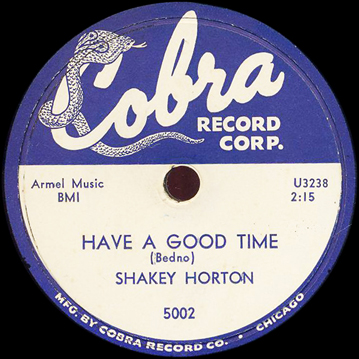
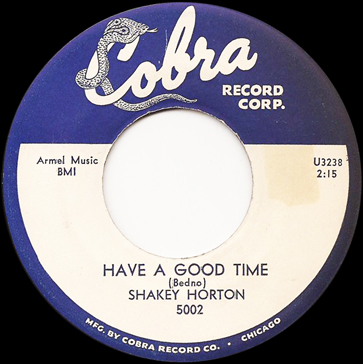
Walter Horton (hca, voc); Harold Ashby (ts); Lafayette Leake (p); Otis Rush (eg); Willie Dixon (b); Al Duncan (d).
Boulevard Studio, Chicago, July 11, 1956
| U3238 | Have a Good Time ("Bedno") | Cobra 5002, Flyright [Br] FLY 567, P-Vine Special [J] PLP-9023, Flyright [Br] FLYCD 11, Paula PCD-7, Capricorn 9-42012 [CD], P-Vine [J] PCD 24075, Fuel 2000 302 061 138 [CD], P-Vine [J] PCD 18528, Fuel 2000 302 061 686 [CD], One Day DAY2CD204 | |
| U3239-1 | Need My Baby | Flyright [Br] FLY 567, Flyright [Br] FLYCD 31, Paula PCD-15, P-Vine [J] PCD 24075 | |
| U3239-2 | Need My Baby ("Bedno") | Cobra 5002, Flyright [Br] FLY 567, P-Vine Special [J] PLP-9023, Paula PCD-7, Capricorn 9-42012 [CD], P-Vine [J] PCD 24075, P-Vine [J] PCD 18528, One Day DAY2CD204 |
Personnel for Cob1 and Cob2 as per Fancourt and McGrath, with one exception: Fancourt and McGrath put Red Holloway on the Otis Rush sides, and the tenor sax work on "I Can't Quit You" and "Sit Down" doesn't sound at all like him. Willie Dixon had already used Harold Ashby on many sessions for Chess and Checker; Ashby seems to be responsible for the prominent obbligato on "Need My Baby" and the solo on "Have a Good Time," and is obviously also the soloist on "Rock and Roll Boogie" (see Cob3 below)—and why would tenor saxophonists have been switched during a single day's outing?
Cobra 5002 may have been intended for inclusion in the company's first wave of releases, but as sales kept building on Cobra 5000, the company purposely delayed it. Plans to release Cobra 5002 and 5003 were mentioned in Cash Box on September 29, 1956 (p. 32). Cobra 5002 then landed two reviews in the same magazine, October 6 (p. 38) and October 20, 1956 (p. 28).
Flyright FLY 567, King Cobras: Chicago Kings of the Harmonica, was released in 1980 in Britain. P-Vine Special [J] PLP-9023 is part of a 4-LP boxed set (PLP-9022/9025), Chicago Blues: A Quarter Century, which was issued in Japan in 1981. Flyright [Br] FLYCD 11 and Paula PCD-7, Chicago Blues Harmonicas, were released in 1989 and 1991; they compile harmonica features derived from JOB, Abco, and Cobra. Flyright [Br] FLYCD 31 and Paula PCD-15, Chicago Piano: 1951-1958 from Cobra & JOB, were CDs released in 1990 and 1991, respectively; Sunnyland Slim appeared on 7 tracks in the compilation, but the alternate of "Need My Baby" was included on the strength of Lafayette Leake's contribution.
P-Vine PCD 24075, Chicago Blues Harp Blowers!, was released in Japan in 2001. It purports to contain a third, previously unknown take of "Need My Baby."
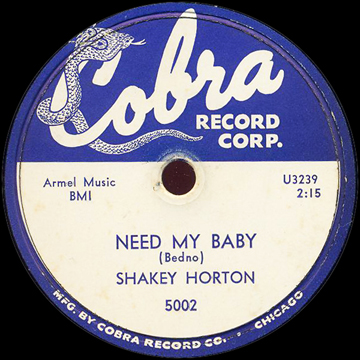
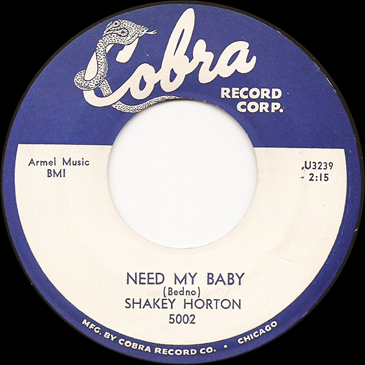
After Walter Horton's two tracks were completed, he made his exit from the session. Still not entirely clear is which guitarist stuck around for the second half of the proceedings.
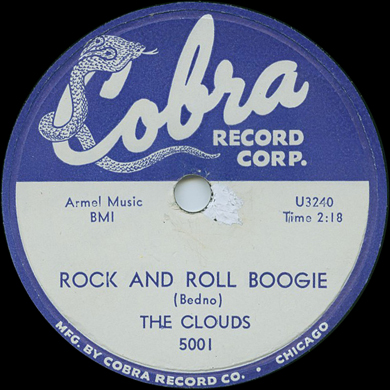
The Clouds: Sherrard Jones, Al Butler, William English, Bobby Walker (voc); Harold Ashby (ts); Lafayette Leake (p); Otis Rush (eg); Willie Dixon (b); Al Duncan (d -1).
Boulevard Studio, Chicago, July 11, 1956
| U3240 | Rock and Roll Boogie ("Bedno") -1 | Cobra 5001, Capricorn 9-42012 [CD], P-Vine [J] PCD 18528, Fuel 2000 302 061 934 [CD], One Day DAY2CD204 | |
| U3241 | I Do (Butler) | Cobra 5001, P-Vine [J] PCD 18528, One Day DAY2CD204 |
The tenor saxophonist on "Rock and Roll Boogie" is audibly Harold Ashby and the combo sounds like the same Willie Dixon unit already familiar from Cob1 and Cob2. The number also features a rather audacious guitar line behind Ashby's tenor sax solo. "I Do" is a "deep" ballad with restrained accompaniment; all but the drums are on it, but the tenor sax subtones throughout.
Helping to establish that the first couple of Cobras were released in mid-August 1956, Cash Box reviewed 5001 on September 1 (p. 36).
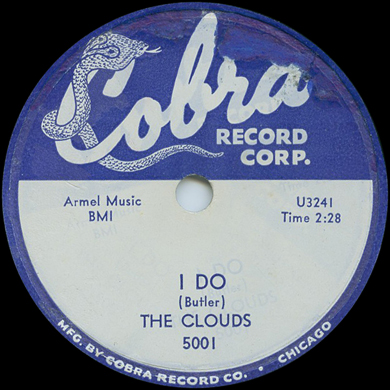
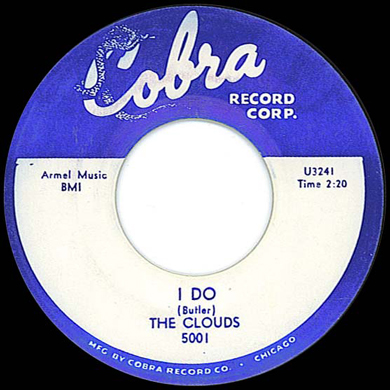
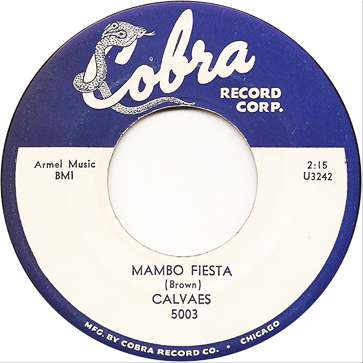
The Calvaes: James "Zeke" Brown, James Williams, Paul Morgan, Donald Coles, James Bailey (voc); Harold Ashby (ts); Lafayette Leake (p); Otis Rush (eg); Willie Dixon (b); Al Duncan (d).
Boulevard Studio, Chicago, July 11, 1956
| U3242 | Mambo Fiesta (Brown) | Cobra 5003, P-Vine [J] PCD 18528, One Day DAY2CD204 | |
| U3243 | Fine Girl ("Bedno") | Cobra 5003, Fuel 2000 302 061 686 [CD], P-Vine [J] PCD 18528, Fuel 2000 302 061 934 [CD], One Day DAY2CD204 |
We got the personnel of the Calvaes and much more about the group from Charlie Horner (with contributions by Pamela Horner and Val Shively), "South Side Harmony in the Windy City: The Calvaes, Blenders & Accents Stories," Echoes of the Past, #87 (2009); Horner draws heavily, in turn, on Robert Pruter, "The James 'Zeke' Brown, The Calvaes and Accents Story," Blues & Rhythm, #218 (April 2007), pp. 10-11.
According to Zeke Brown, Ted Daniels managed the Calvaes and brought them to Cobra. Brown recalled the studio for the Calvaes' first session as "on the second floor of the Kimball building downtown." He also recalled the Clouds and Otis Rush being present.
Although Cobra 5003 was reviewed in Billboard on September 29, 1956 and in Cash Box on October 13 (p. 44), Zeke Brown said that DJ Sam Evans was playing it on August 10, the night before the Bud Billiken Parade. Evans could have been given a test pressing; there had been a month to prepare one. The Calvaes also appeared in a big package show under Evans' sponsorship, on September 1, 1956. Most likely Toscano and Bedno decided to delay the releases of Cobra 5002 and 5003 after they realized that they had a hit on their hands, and they needed as many opportunities as possible to build up the sales of Cobra 5000.
According to Horner, Zeke Brown sang lead on "Mambo Fiesta" and Donald Coles was the lead on "Fine Girl." A listen to "Fine Girl" confirms that the same band is on Cob4 as Cob3. Harold Ashby solos on "Fine Girl." "Mambo Fiesta" has the same lineup; is that Otis Rush taking the guitar solo?.
A 2007 CD compilation titled Treasures from the Vaults, on Fuel 2000 302 061 686, includes "Fine Girl," obviously dubbed from a copy of Cobra 5003 with a rough spot on it; the same dub appears on the 2012 2-CD on Fuel 2000 302 061 934, The Cobra Records Singles Collection. According to Bill Dahl, he had to transfer the side off a 45 for the 2007 Fuel collection because the tapes are long lost.
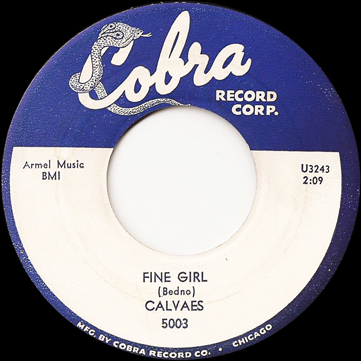
The practice of attributing compositions to Howard Bedno was abruptly terminated after the first session for the new label. Willie Dixon must have taken strong exception to it ("Sit Down Baby" from Cob1 was his tune; so, apparently, was "Rock and Roll Boogie" from Cob 2). Occasionally, however, one "Archie" shows up on a later Cobra or Artistic label. Archie was Mrs. Toscano.
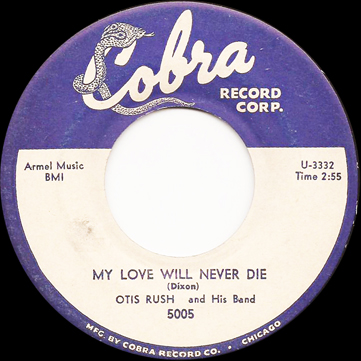
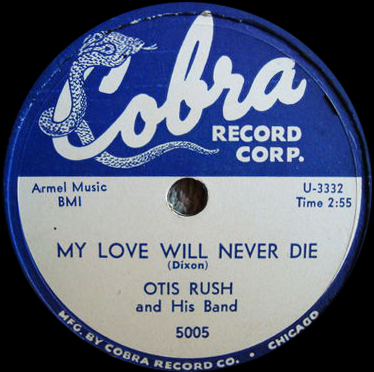
Otis Rush (eg, voc except -1); Harold Ashby (ts except -1); Lucius "Little Wash" Washington (ts except -1); Lafayette Leake (p); Wayne Bennett (eg except -1); Willie Dixon (voc -1, b); Al Duncan (d except -1).
Boulevard Studio, Chicago, October 1956
| U-3331 | Violent Love (Dixon) | Cobra 5005, Negro Art [F] M-12-SB-367, Blue Horizon [Br] 7-63222, Epic ECPJ-19, Flyright [Br] FLY 560, P-Vine Special [J] PLP-9012, Flyright [Br] FLYCD01, P-Vine [J] PCD-2128, Paula PCD01, P-Vine [J] PCD 2346, P-Vine [J] PCD 2350, Capricorn 9-42012 [CD], P-Vine [J] PCD-24038, Fuel 2000 302 061 077 [CD], P-Vine [J] PCD 18528 | |
| U3331 [alt.] | Violent Love | Flyright [Br] FLY 562, Flyright [Br] FLYCD 18, Paula PCD-9, P-Vine [J] PCD 2350 | |
| U3332 alt. | My Love Will Never Die -1 | P-Vine Special [J] PLP-9013, Fuel 2000 302 061 138 [CD] | |
| U3332 tk. 4 | My Love Will Never Die | Blue Horizon [Br] 7-63222, Epic ECPJ-19, Flyright [Br] FLY 560, P-Vine Special [J] PLP-9013, P-Vine [J] PCD-2128, Flyright [Br] FLYCD 18, Paula PCD-9, P-Vine [J] PCD-24038, Fuel 2000 302 061 077 [CD], Fuel 2000 302 061 138 [CD] | |
| U3332 tk. 5 [fs] | My Love Will Never Die | Fuel 2000 302 061 138 [CD] | |
| U3332 tk. 6 [fs] | My Love Will Never Die | Fuel 2000 302 061 138 [CD] | |
| U3332 tk. 7 | My Love Will Never Die | Fuel 2000 302 061 138 [CD] | |
| U-3332 | My Love Will Never Die (Dixon) | Cobra 5005, Bluestown 778, Flyright [Br] FLY 562, P-Vine Special [J] PLP-9012, Flyright [Br] FLYCD01, P-Vine [J] PCD-2128, Paula PCD01, Capricorn 9-42012 [CD], P-Vine [J] PCD-24038, Fuel 2000 302 061 077 [CD], P-Vine [J] PCD 18528, Fuel 2000 302 061 934 [CD] |
Session information, except for the date, from Fancourt and McGrath. After the first four releases, Cobra went back into the studio in October, or so we have estimated from the matrix numbers. Again, while the matrix series is out of Universal, Bedno's recollections place the October session at Boulevard. Harold Ashby is responsible for the tenor sax solo on "Violent Love."
Cobra 5005 was released in late November 1956. On December 1, Cash Box proclaimeed that orders for it already pouring into the Cobra/AB complex (p. 34). An ad for Cobra 5004, in the same issue (p. 35), promised the "Big-New-Big" Otis Rush release "next week." Cobra 5004 and 5005 were jointly advertised in Cash Box on December 15 (p. 37), December 22 (p. 36), and December 29 (p. 37). 5005 was reviewed in Cash Box on December 22, 1956 (p. 37). The company kept pushing both singles for weeks; conjoined ads ran in Cash Box on January 5 (p. 23), January 12 (p. 32), January 19 (p. 43), January 26 (p. 35) and February 2, 1957 (p. 37). The last ad ran on February 16 (p. 45).
Negro Art M-12-SB-367, Story of the Blues: Chicago Blues Volume 3, was an LP released in France around 1968. On P-Vine Special PLP-9013, Otis Rush: Cobra Alternates, a 1980 release, the alternate take of "My Love Will Never Die" is identified as take 4, and another version (Side A track 6 on the P-Vine) is included, with Willie Dixon running through the song, accompanied only by Lafayette Leake. This preceded track 4 but has no take number on the tape. On Fuel 2000 302 061 138, released in the United States in 2001 as Willie Dixon: Mr. Dixon's Workshop, the final track consists of the Dixon rendition of "My Love Will Never Die" followed by takes 4 through 7.
Flryright FLYCD01, Otis Rush: I Can't Quit You Baby, was released in Britain in 1989; its American derivative, Paula PCD01, Otis Rush 1956-1958, probably came out in 1990. Flyright FLYCD 18 and Paula PCD-9, Chicago Boss Guitars: Otis Rush Buddy Guy Magic Sam, were both released in 1991. P-Vine PCD 2350, Buddy Guy, Otis Rush & Magic Sam at the Cobra Studio, 1956-58, was released in Japan in 1992. It includes all of the false starts, countdowns, studio chatter, and alternate takes for each of the items selected. "Yes," says Frank Scott. "8 minutes of 'Violent Love' — who could ask for anything more." By contrast, the 2001 Otis Rush collection on P-Vine, PCD-24038, includes the alternate take of "My Love Will Never Die" but leaves out the alternate of "Violent Love." The Fuel 2000 Otis Rush collection on 302 061 077, also released in 2001, does likewise.
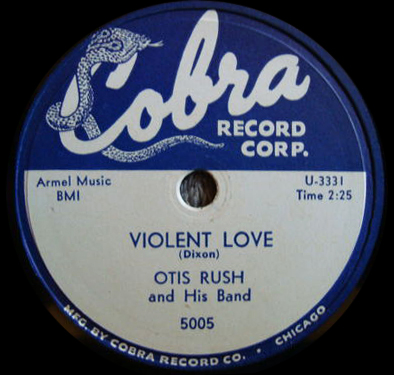
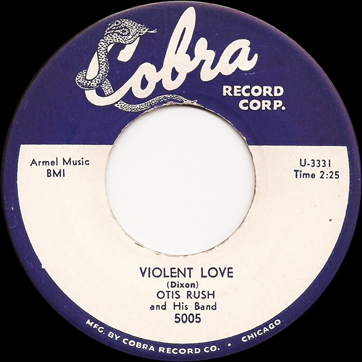
Singer and pianist Harold Burrage, at the age of 25, was already a veteran performer when Cobra signed him. Burrage was born in Chicago on March 30, 1931. He was 19 when he made his first single for Decca in 1950, with accompaniment by a Horace Henderson combo. His cover of "Hi Yo" (Silver) appeared on Decca 48175 (Billboard reviewed it on October 21, 1950, p. 33). In 1952, Burrage followed up with two sides for Aladdin, this time with Jimmy Binkley's group; Aladdin 3194, which featured his vocals, was probably out in July 1953. In November 1954, Burrage appeared on a memorable session under his own name for States, and in October 1955, he headlined a revue at the Grand Terrace with accompaniment by the first edition of Sun Ra's Arkestra.
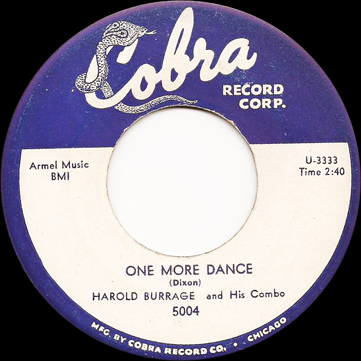
Harold Burrage (voc, p); Harold Ashby (ts); Lucius Washington (ts); Wayne Bennett (eg); Willie Dixon (b); Al Duncan (d).
Boulevard Studio, Chicago, October 1956
| U-3333 | One More Dance (Dixon) | Cobra 5004, Flyright [Br] FLY 579, Westide [Br] WESM 634 [CD], P-Vine [J] PCD 18528 | |
| U-3334 | You Eat Too Much (Burrage) | Cobra 5004, Flyright [Br] FLY 579, Westide [Br] WESM 634 [CD], Fuel 2000 302 061 686 [CD], P-Vine [J] PCD 18528, Fuel 302 061 934 [CD] |
Session information from Fancourt and McGrath. Obviously Cobra 5004 and 5005 were made in one session, with Otis Rush exiting after his sides were completed and Harold Burrage (apparently) taking over at the piano bench. Harold Ashby gets the tenor sax solos on both sides.
Cobra 5004 was first advertised in Cash Box on December 1, 1956 (p. 35). The same issue had Eli Toscano giving out test pressings of Cobra 5004 and 5005 to DJs in Nashville (p. 34). So 5004 was a late November release.
Cobra 5004 was reviewed in Cash Box on December 15, 1956 (p. 40). Cobra 5004 and 5005 were reviewed in Billboard on December 15, 1956. Cobra featured them in a company ad in Cash Box in Cash Box on December 15, 1956 (p. 37), December 22 (p. 36), and December 29 (p. 37). Cobra was still advertising them together in Cash Box for January 5 (p. 23), January 12 (p. 32), January 19 (p. 43), January 26 (p. 35), February 2 (p. 37), and February 9, 1957 (p. 41). The last ad ran on February 16 (p. 45).
Flyright FLY 579, Harold Burrage: She Knocks Me Out, was released in Britain in 1981. Westside WESM 634, a British release from 2001, was titled Messed Up! The Complete Cobra Recordings.
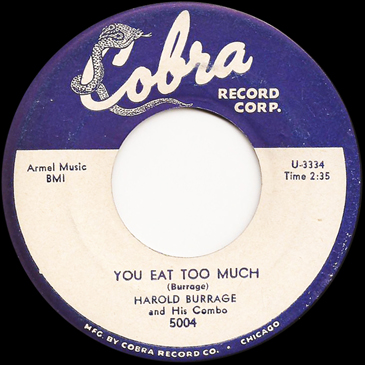
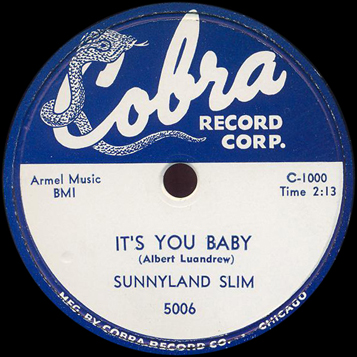
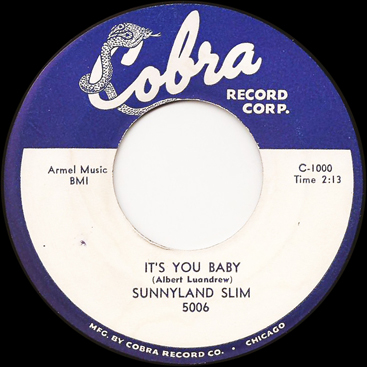
Sunnyland Slim (p, voc); Walter Horton (voc -1, hca); Jimmy Rogers (eg except -1); Poor Bob Woodfork (eg except -1); Willie Dixon (speech -1, b); S. P. Leary (d except -1).
Studio B, Universal Recording, November or December 1956
| C-1000 | It's You Baby (Luandrew) | Cobra 5006, Flyright [Br] FLY 567, P-Vine Special [J] PLP-9024, Flyright [Br] FLYCD 31, Paula PCD-15, Capricorn 9-42012 [CD], P-Vine [J] PCD 24075, P-Vine [J] PCD 18528, Fuel 2000 302 061 934 [CD], One Day DAY2CD204 | |
| Highway 61 | Flyright [Br] FLY 594 | ||
| [inc.] | Highway 61 | Flyright [Br] FLY 594 | |
| Highway 61 | Flyright [Br] FLY 594, Flyright [Br] FLYCD 31, Paula PCD-15, P-Vine [J] PCD 24075 | ||
| C-1001 | Highway 61 (Luandrew) | Cobra 5006, Flyright [Br] FLY 567, P-Vine Special [J] PLP-9024, Flyright [Br] FLYCD 11, Paula PCD-7, Capricorn 9-42012 [CD], P-Vine [J] PCD 24075, P-Vine [J] PCD 18528, One Day DAY2CD204 | |
| Eli Toscano Blues | Flyright [Br] FLY 594, Capricorn CD 9-40212, Westside WESA 868 [CD], Westside WESA 910 [CD] |
Further confusion results from this rare excursion to Universal, just as Cobra was switching to the in-house matrix system (C1000 through C1067) that it would use for the rest of the company's lifetime. The sound is so raw on the issued take of "Highway 61" that most listeners would never suspect the location. But the alternate take used on Paula PCD-15, though still somewhat rough, actually resembles a Universal product. And the only take of "It's You Baby" is less prone to overload than the released "Highway 61." Malcolm Chisholm, a recording engineer who worked for Universal at the time, confirmed in his Capricorn box interview that he did a Sunnyland Slim session in Studio B, at the 111 East Ontario location.
Session listing is from Fancourt and McGrath, though Woodfork seems to be playing a second guitar and not an electric bass as originally listed.
On February 9, 1957, the readers of Cash Box were warned (p. 40) that the releases of Cobra 5006, 5007, 5008, and 5009 were imminent. But on February 16 Cash Box (p. 40) had Eli Toscano "not certain now, whether he should or should release new disks" because 5004 and 5005 were still selling. The uncertainty didn't last. The next week saw the new company ad ("Cobra Strikes Back") for Cobra 5006 through 5009 (Cash Box, February 23, p. 36) and a Chicago R&B mention of all four (p. 34). Cobra 5006 through 5009 were all reviewed in Billboard on February 23, 1957. The company reran its February 23 ad in Cash Box on March 2, 1957 (p. 33) and again on March 9 (p. 40).
Cobra 5006 received its review in Cash Box on March 9, 1957 (p. 43).
Flyright FLY 567, King Cobras: Chicago Kings of the Harmonica, was released in Britain in 1980. P-Vine Special [J] PLP-9024 is a part of a 4-LP box, 9022/9025, released in Japan in 1981 under the title Chicago Blues: A Quarter Century. Flyright FLYCD 31 and Paula PCD-15, Chicago Piano: 1951-1958 from Cobra & JOB, are CDs released in 1990 and 1991, each including 7 tracks with Sunnyland Slim. P-Vine PCD 24075, released in Japan in 2001, was titled Chicago Blues Harp Blowers!
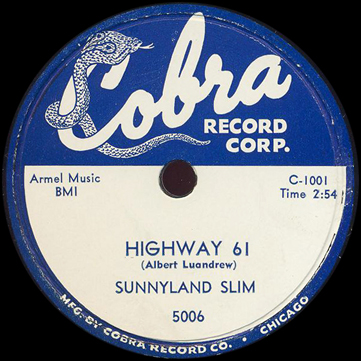
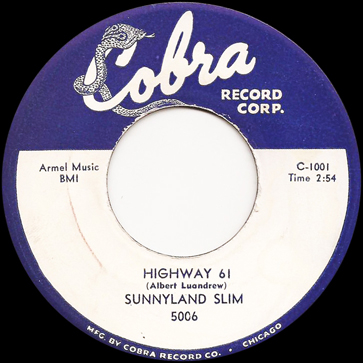
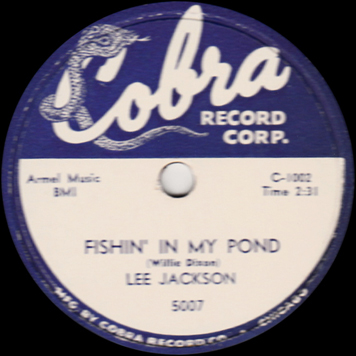
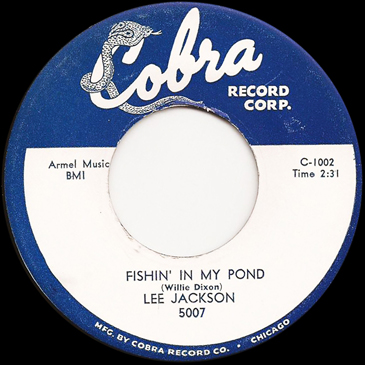
Warren G. Hardin Lee aka Lee Jackson (eg, voc); Walter Horton (hca); Harold Ashby (ts); Lucius Washington or John Tinsley (ts); Sunnyland Slim (p); Jimmy Rogers (eg); Willie Dixon (b); Jesse Fowler or Henry "Sneaky Joe" Harris (d).
Chicago, November or December 1956
| C-1002 | Fishin' in My Pond (Dixon) | Cobra 5007, Flyright [Br] FLY 582, P-Vine Special [J] PLP-9024, P-Vine [J] PCD 24074, Fuel 2000 302 061 138 [CD], P-Vine [J] PCD 18528, Fuel 2000 302 061 934 [CD] |
Session information from Fancourt and McGrath. Walter Horton is audible on this side.
A company ad ("Cobra Strikes Back") for Cobra 5006 through 5009 appeared in Cash Box on February 23, 1957, p. 36. There was also a Chicago R&B mention of all four (Cash Box, p. 34). Cash Box reviewed 5007 on March 2, 1957 (p. 36) and Cobra reran its February 23 ad in the same issue (p. 33). Another repetition of the ad followed on March 9, 1957 (p. 43).
Flyright FLY 582, Fishin' in My Pond: Chicago Blues Bands, was released in Britain in 1981. P-Vine Special [J] PLP-9024 is a part of a 4-LP box, 9022/9025, released in Japan in 1981 under the title Chicago Blues: A Quarter Century. Fuel 2000 302 061 934 is a 2-CD set from 2012 titled The Cobra Records Singles Collection. The pianist could just as easily be Lafayette Leake
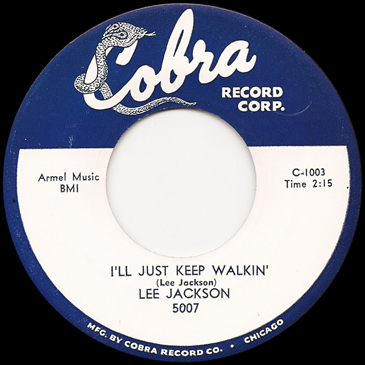
Lee Jackson (eg, voc); Harold Ashby (ts); Lucius Washington or John Tinsley (ts); Lafayette Leake (p, org); Otis Rush (eg); Willie Dixon (b); Odie Payne (d).
Chicago, November or December 1956
| C-1003 | I'll Just Keep Walkin' (Jackson) | Cobra 5007, Flyright [Br] FLY 582, P-Vine Special [J] PLP-9024, P-Vine [J] PCD 24074, Fuel 2000 302 061 686 [CD], P-Vine [J] PCD 18528, One Day DAY2CD204 |
Personnel from Fancourt and McGrath, except they put Walter Horton on this track and no harmonica can be heard; Lafayette Leake also plays some organ. Lucius Washington and John Tinsley didn't sound all that similar but we're talking about a second tenor sax on a cut where both tenors are mightily recessed.
P-Vine PCD 24074 was a 2001 Japanese release titled Chicago Blues Guitar Killers!.
Harold Burrage (voc); Johnny Jones or Henry Gray (p); Magic Sam (eg); Willie Dixon (b); Bill Stepney (d).
Chicago, poss. late 1956
| tk. 3 | Hot Dog and a Bottle of Pop | Flyright [Br] FLY 579, P-Vine Special [J] PLP-9021, Westside [Br] WESM 634 [CD] |
An isolated track of uncertain provenance. According to the Flyright notes, there were three "takes" of this piece, but they all used the same instrumental track, varying only in the finesse with which Harold Burrage's vocals were double-tracked. The version deemed the best-sounding (a relative judgment—we wish Toscano hadn't bothered) was selected for Flyright FLY 579 and has been used in subsequent reissues. Flyright FLY 579 was released in Britain in 1981, as Harold Burrage: She Knocks Me Out. Westside WESM 634, Harold Burrage: Messed Up!, was released in Britain in 2001.
The guitar work does indeed appear to be Magic Sam's. But unless he was double-tracked, Harold Burrage wasn't the only vocalist. Although he had been doing sideman work in 1956, the presence of Magic Sam does push more for a 1957 date. Meanwhile, the only Cobra session that we know Henry Gray played on (Burrage's Cob32) took place in 1958...
During 1956, Cobra laid down 28 surviving tracks (incuding alternate takes). There were 6 releases up to the end of the year. It would be nice to say that the company was just geting started, but Cobra 5000 was and would remain the company's biggest hit.
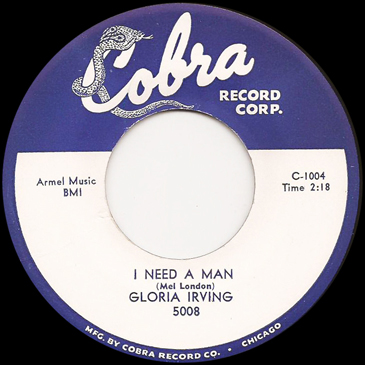
Gloria Irving (voc); Harold Ashby (ts); unidentified (ts); unidentified (p); unidentified (eg); Willie Dixon (b); unidentified (d, Latin perc).
Chicago, January 1957
| C-1004 | I Need a Man (Mel London) | Cobra 5008, P-Vine [J] PCD 18528, Fuel 2000 302 061 934 [CD], One Day DAY2CD204 | |
| C-1005 | For You and Only You (Dixon) | Cobra 5008, P-Vine [J] PCD 18528 |
Fancourt and McGrath give an instrumental lineup with no personnel.
However, there are two tenor saxes on the date, not an alto and a tenor. There are two tenor sax solos on "I Need a Man"; unusually, it sounds as though each tenor got one. One of the tenors was obviously Harold Ashby.
A listen to both sides indicates that Willie Dixon was running the sesssion and playing bass on it. Ashby was one of Dixon's go-to musicians during this period.
The cowbell on "I Need a Man" could be the work of Odie Payne—but this session isn't quite ready to give up its mysteries.
Eli Toscano was telling Cash Box on February 9, 1957 (p. 40) about the impending releases of Cobra 5006 through 5009. A company ad ("Cobra Strikes Back") for Cobra 5006 through 5009 appeared in Cash Box on February 23, 1957, p. 36. There was also a Chicago R&B mention of all four (Cash Box, p. 34). And Cobra 5008 was reviewed in the same issue (p. 38). The Cobra 5006 through 5009 ad ran again in Cash Box on March 2 (p. 33).
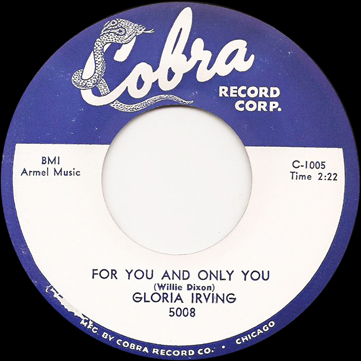
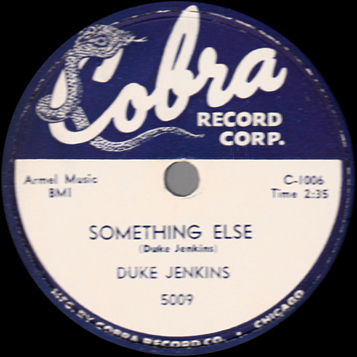
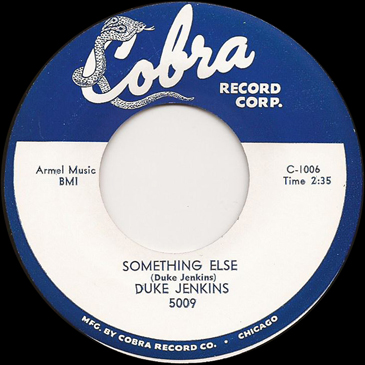
Earl "Duke" Jenkins (p, voc); Leroy Clark (tp); Bill Parker (ts); Freddie Jenkins (as, bars); Curtis Wilder (b); John Brown or Archie Taylor (d).
Chicago, January 1957
| C-1006 | Something Else (Jenkins) | Cobra 5009, Fuel 2000 302 061 686 [CD], P-Vine [J] PCD 18528, One Day DAY2CD204 | |
| C-1007 | The Duke Walks (Jenkins) | Cobra 5009, Fuel 2000 302 061 686 [CD], P-Vine [J] PCD 18528, Fuel 2000 302 061 934 [CD], One Day DAY2CD204 |
Personnel as given in Fancourt and McGrath. Leroy Clark plays the opening statement of "Something Else" on trumpet and Bill Parker solos on tenor sax—whereupon Freddy Jenkins, uncredited by F and M, takes his own solo on alto. "The Duke Walks" features Jenkins on piano and Parker on tenor.
Cobra 5006 through 5009 were said to be impending in Cash Box for February 9, 1957 (p. 40). Cobra 5006 through 5009 were all reviewed in Billboard on February 23, 1957. A company ad ("Cobra Strikes Back") for Cobra 5006 through 5009 appeared in Cash Box on February 23, 1957 (p. 36.) There was also a Chicago R&B mention of all four (Cash Box, p. 34). Cash Box reviewed Cobra 5009 on March 2, 1957 (p. 36); the February 23 ad ran again in the same issue (p. 33), and was reprised on March 9 (p. 43).
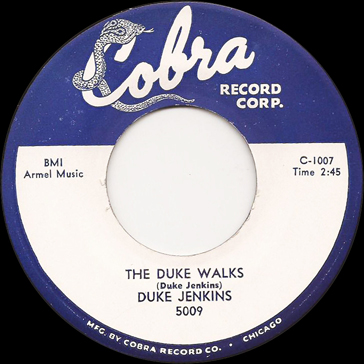
Eli Toscano was already complaining in November 1956 that he lacked space at the 2854 address (Cash Box, November 10, 1956, p. 28). At year's end he was promising to "be in new offices directly after the first of the year" (Cash Box, December 29, 1956, p. 34). Not directly. But by mid-March of 1957 Toscano had moved his store 5 blocks down the street, to 3346 West Roosevelt, and in the larger quarters he was operating a makeshift studio. (For some reason, the new address did not appear right away in company ads, though it is attested as of May 1957.) 3346 West Roosevelt would be Cobra's address until the company closed.
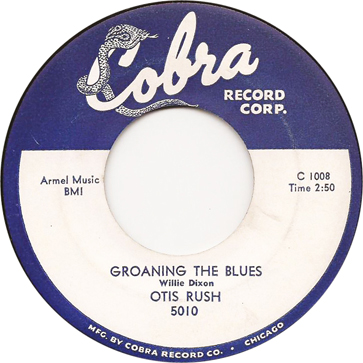
Otis Rush (eg, voc); Marion Walter "Little Walter" Jacobs (hca); Harold Ashby (ts); Jody Williams (eg); Willie Dixon (b); Odie Payne (d).
Cobra Studio, Chicago, March 1957
| C 1008 | Groaning the Blues (Dixon) | Cobra 5010, Flyright [Br] 562, P-Vine Special [J] PLP-9012, Flyright [Br] FLYCD01, P-Vine [J] PCD-2128, Paula PCD01, Flyright [Br] FLYCD 18, Paula PCD-9, Capricorn 9-42012 [CD], P-Vine [J] PCD-24038, Fuel 2000 302 061 077 [CD], P-Vine [J] PCD 18528 | |
| C1008 [tk. 2] | Groaning the Blues | Blue Horizon [Br] 7-63222, Epic ECPJ-19, Flyright [Br] FLY 560, P-Vine Special [J] PLP-9013, P-Vine [J] PCD-2128, P-Vine [J] PCD-24038 | |
| C1008 [tk. 3] | Groaning the Blues | P-Vine Special [J] PLP-9013, Flyright [Br] FLY 594, P-Vine [J] PCD-2128, P-Vine [J] PCD-24038, Fuel 2000 302 061 077 [CD] | |
| C 1009 | If You Were Mine (Dixon) | Cobra 5010, Blue Horizon [Br] 7-63222, Epic ECPJ-19, Flyright [Br] FLY 560, P-Vine Special [J] PLP-9012, Flyright [Br] FLYCD01, P-Vine [J] PCD-2128, Paula PCD01, P-Vine [J] PCD-24038, Fuel 2000 302 061 077 [CD], P-Vine [J] PCD 18528 |
Harold Ashby gets a tenor sax solo on "If You Were Mine." Jody Williams' accompaniment is audible on both released sides.
Cobra ran a teaser ad for what turned out to be 5010 ("Watch for New … Otis Rush Release") in Cash Box for March 30, 1957 (p. 45). Although the ad still gave 2854 West Roosevelt for the company address, an item in the same issue (p. 42) noted that Toscano and Bedno were in their "new building." Cash Box ran the same teaser ad (again with the old address) on April 6 (p. 41). The Cobra studio could have been up and running by this time, if only for a couple of weeks. Cobra 5010 was reviewed in Cash Box on April 13, 1957 (p. 46) and in Billboard on April 20, 1957. Cash Box ads for 5010 and 5011 ran on April 13 (p. 47), April 20, (p. 45), April 27 (p. 41), and—finally with the 3346 address—on May 4, 1957 (p. 39).
P-Vine Special PLP-9013 was released in Japan in 1980, under the title Otis Rush: Cobra Alternates. Flyright FLYCD01 was released in Britain in 1989 as Otis Rush: I Can't Quit You Baby; its American derivative was Paula PCD01, Otis Rush 1956-1958, probably from 1990. P-Vine PCD-2128, Otis Rush: The Cobra Sessions 1956-1958, was released in Japan in 1989. Flyright FLYCD 18 and Paula PCD-9, Chicago Boss Guitars, each contained one of the alternate takes of "Groaning the Blues"—we don't know which. P-Vine PCD-24038, Otis Rush: I Can't Quit You Baby—The Cobra Sessions 1956-1958, was released in Japan in 2001. Fuel 2000 302 061 077, The Essential Otis Rush: Classic Cobra Sessions, was released in the United States in 2001.
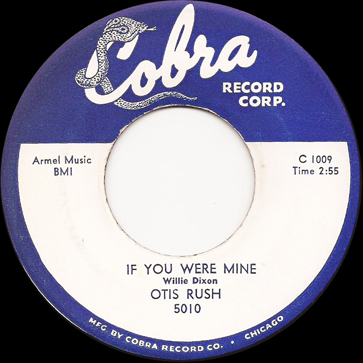
An all-star show put on by Sam Evans at the Opera House, April 12, 1957, featured Otis Rush and Sunnyland Slim along with Little Richard, Buddy Knox, the Del-Vikings, the Dells, the Spaniels, and an Al Smith combo (Cash Box, April 13, 1957, p. 42). We think the ticket buyers got value for their money.
Little Willie Foster was born in Clarksdale, Mississippi, on April 5, 1922. He came to Chicago in 1941 and learned his harmonica from Big Walter Horton. His first two sessons were done for Parrot/Blue Lake. The labels' owner, Al Benson, discovered Foster performing at Vi's Lounge, on the West Side. Foster made made two sides at a session in January 1955. A second session, in June 1955, apparently did not produce satisfactory results, so those from January were put out twice, first on Blue Lake and later on Parrot. Foster ended up complaining to Local 208 about Benson scheduling 2-tune sessions and paying half of Union scale for them
For Cobra, Foster again used Lazy Bill Lucas from his January 1955 session for Blue Lake, and Ray Scott from the failed outing of June 1955 (there were two Ray Scotts who worked as blues drummers in Chicago; this was probably "the other Ray Scott," not Walter Spriggs, who took up Ray Scott as one of several pseudonyms). Floyd Jones, who had made both Blue Lake sessions, was one of the guitarists. Who the second guitarist was, we have no idea. His name is now given as Triolue High. Older discographies, unable to make sense of the name, called him "Teeno Yehire," but we're not sure that the more recent spelling is correct either.
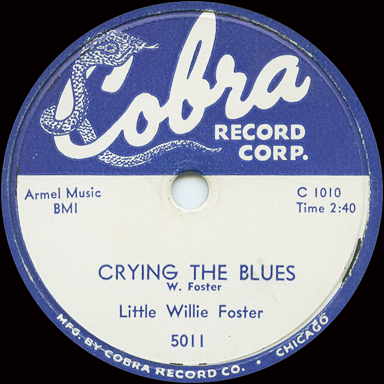
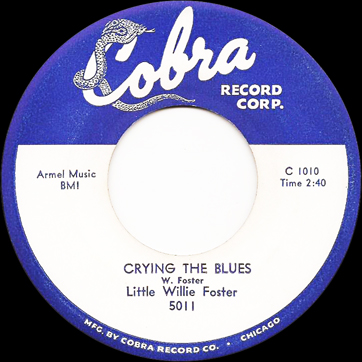
Little Willie Foster (hca, voc -1); Lazy Bill Lucas (p); Floyd Jones (voc on -2, eg); Triolue High (eg); prob. Willie Dixon (b); Walter Spriggs aka Ray Scott (d).
Cobra Studio, Chicago, March 1957
| C 1010 | Crying the Blues (Foster) -1 | Cobra 5011, Boogie Disease BD 101/102, Flyright [Br] FLY 567, P-Vine Special [J] PLP-9023, Flyright [Br] FLYCD 11, Paula PCD-7, Fuel 2000 302 061 686 [CD], Capricorn 9-42012 [CD], P-Vine [J] PCD 24075, P-Vine [J] PCD 18529, One Day DAY2CD204 | |
| C 1011 | Little Girl (Foster) -2 | Cobra 5011, Boogie Disease BD 101/102, Flyright [Br] FLY 567, P-Vine Special [J] PLP-9023, Flyright [Br] FLYCD 11, Paula PCD-7, Capricorn 9-42012 [CD], P-Vine [J] PCD 24075, P-Vine [J] PCD 18529, Fuel 2000 302 061 934 [CD], One Day DAY2CD204 |
Personnel from Fancourt and McGrath. Cobra 5011 was reviewed in Cash Box on April 13 (p. 45) and in Billboard on April 20, 1957. I>Cash Box ads for 5010 and 5011 ran on April 13 (p. 47), April 20, (p. 45), April 27 (p. 41), and—finally with the 3346 address—on May 4, 1957 (p. 39). Obviously, the 1956 date usually attached to this session needs changing. The tubby sound and strange balance among the instruments inform us that Cobra Studio was now in operation. Despite the delay (till May 4) in mentioning the address in advertisements, we no know that the company had already relocated to 3346 West Roosevelt by mid-March,.
Boogie Disease BD 101/102, Take a Little Walk with Me: The Blues in Chicago 1948-1957, was a limited edition 2-LP set released in 1972. Flyright [Br] FLY 567, King Cobras: Chicago Kings of the Harmonica, was released in 1980. P-Vine Special [J] PLP-9023 is a part of a 4-LP box, 9022/9025, released in Japan in 1981 under the title Chicago Blues: A Quarter Century. P-Vine PCD 24075, Chicago Blues Harp Blowers!, was released in Japan in 2001.
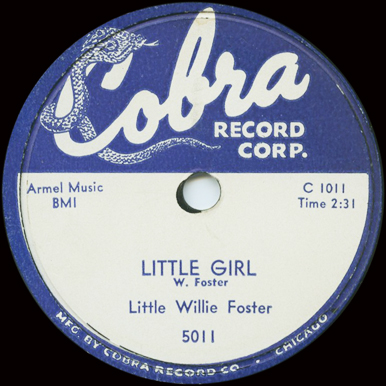
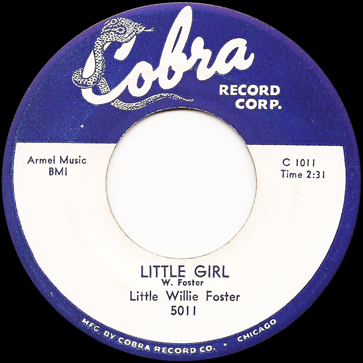
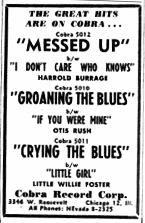
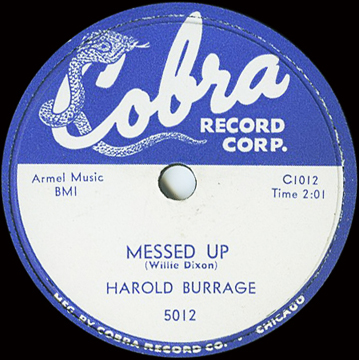
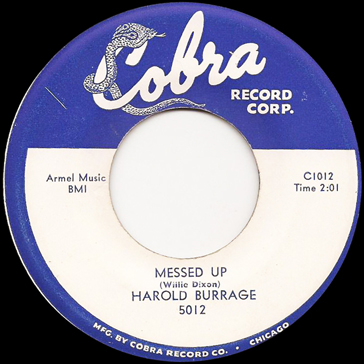
Harold Burrage (voc, p); Harold Ashby (ts); poss. Red Holloway (ts); Jody Williams (eg); Willie Dixon (b); Odie Payne (d).
Cobra Studio, Chicago, April 1957
| C1012 | Messed Up (Dixon) | Cobra 5012, Westside [Br] WESM 634 [CD], Fuel 2000 302 061 686 [CD], P-Vine [J] PCD 18529, Fuel 2000 302 061 934 [CD], One Day DAY2CD204 | |
| C1013-1 | I Love My Baby [I Don't Care Who Knows] | unissued | |
| C1013-2 | I Love My Baby [I Don't Care Who Knows] | P-Vine Special [J] PLP 9021, Flyright [Br] FLY 579, Westside [Br] WESM 634 [CD], Capricorn 9-42012 [CD], Westside [Br] WESM 634 [CD], Fuel 2000 302 061 138 [CD] | |
| C1013-3 | I Love My Baby [I Don't Care Who Knows] | Flyright [Br] FLY 579, Westside [Br] WESM 634 [CD] | |
| C1013-4 | I Don't Care Who Knows (Dixon) | Cobra 5012, Westside [Br] WESM 634 [CD], P-Vine [J] PCD 24074, P-Vine [J] PCD 18529 |
Session information, except for the month, from Fancourt and McGrath; they don't mention the second tenor sax, but it's easily heard on "Messed Up." The extent of Red Holloway's participation remains a puzzle, but he recalled the Cobra studio and Toscano's recording practices in an interview. The sonics aren't the worst for a Cobra Studio recording, if that's what this was. "I Don't Care Who Knows" includes a fierce guitar solo by Jody Williams.
Cobra 5012 was first mentioned in a company ad in Cash Box on May 11, 1957 (p. 49); it shared the space with 5010 and 5011. Another such ad ran on May 18 (p. 28), and there were follow-ups on May 25 (p. 103) and June 1 (p. 45). On June 8, Cash Box noted (p. 36) that Cobra artists Willie Dixon, Harold Burrage, and Otis Rush had all performed at a dance sponsored by DJ Larry Wyn; also on the bill were The Spaniels and Annie Laurie.
Cash Box reviewed 5012 on June 1, 1957 (p. 48). Cobra then ran solo ads for it (June 8, p. 41) and June 15 (p. 53); these changed the release number to "5017." At Billboard, Cobra 5012 was advertised on May 20, 1957, and again on June 10 (with the same incorrect release number as the Cash Box ads, p. 60). In preparation for the NAMM convention, Cobra ran an ad spanning 5012, 5013, and 5015 in Cash Box for July 20, 1957 (p. 87).
Flyright FLY 579 was released in Britain in 1981, as Harold Burrage: She Knocks Me Out. It contains takes 2 and 3 of "I Love My Baby," retitled for reasons not known to us. Westside WESM 634 was released on in CD in Great Britain in 2001, as Harold Burrage: Messed Up! P-Vine PCD 24074 was released in Japan in 2001; the title was Chicago Blues Guitar Killers!. Fuel 2000 302 061 138, Willie Dixon: Mr. Dixon's Workshop, was released in the United States in 2001; it uses an alternate take of "I Don't Care Who Knows," purportedly the one with the best Jody Williams guitar solo.
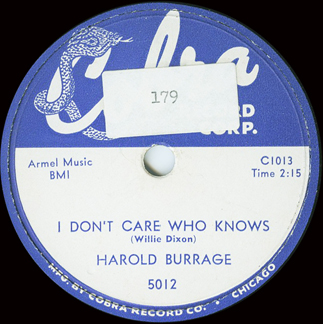
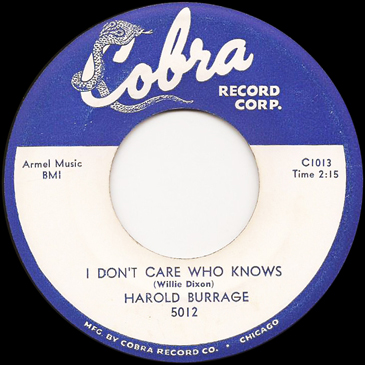
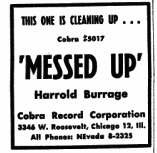
The second member of Cobra's guitar-playing triumvirate, who has been known since his first session for the label as Magic Sam, was born Samuel Gene Maghett in Grenada, Mississippi, on February 4, 1937. He learned to play the blues off records by Muddy Waters and Little Walter. Arriving in Chicago in 1950, he fell in with Sylvester Thompson (later Syl Johnson) and his brother Mack, and by 1955 was sitting in at the 708 Club. We don't know what led Eli Toscano and Willie Dixon to decide to record him; one possibility (see below) was that they discovered a rival inidie was using him as a sideman. The first Cash Box ads for Sam's Cobra 5013 (see below) declare that "He came from nowhere with a hat full of hits." We used to credit Magic Sam with lead guitar on the session (around May 1956) that produced Abco 105 and 106, but expert opinion indicates it was Wayne Bennett. Maghett had been going as Good Rocking Sam, but on learning that another performer was already recording under the handle, Mack Thompson came up with Magic Sam, which stuck.
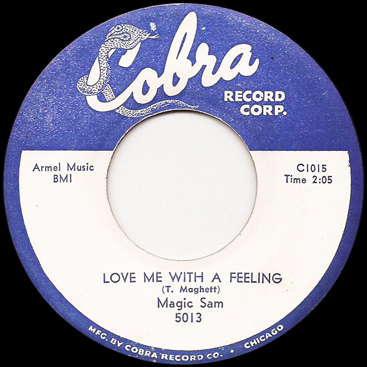
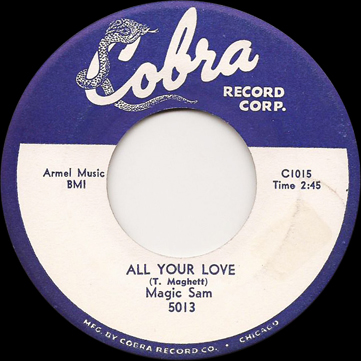
Samuel Maghett (eg, voc); Eurreal "Little Brother" Montgomery (p except 1014, 1015); unidentified (eg); Mack Thompson (eb); Willie Dixon (b); Bill Stepney (d).
Cobra Studio, Chicago, c. May 1957
| tk. 1 | Love Me with a Feeling | Blue Horizon [Br] 7-63223, Flyright [Br] FLY 561, P-Vine PLP [J] PLP-9011, P-Vine [J] PCD 2350, P-Vine [J] PCD 24062, Fuel 2000 302 061 104 [CD] | |
| tk. 2 | Love Me with a Feeling | Flyright [Br] FLY 562, P-Vine [J] PCD 2350 | |
| C1014 [C1015 on label] |
Love Me with a Feeling (Maghett) | Cobra 5013, Fox 5013, Flyright [Br] FLY 562, P-Vine [J] PCD-2123, Flyright [Br] FLYCD02, Paula PCD02, Flyright [Br] FLYCD 18, Paula PCD-9, P-Vine [J] PCD 2350, P-Vine [J] PCD 24062, Fuel 2000 302 061 104 [CD], P-Vine [J] PCD 18529, Fuel 2000 302 061 920 [CD] | |
| C1015 | All Your Love (Maghett) | Cobra 5013, Fox 5013, Flyright [Br] FLY 562, P-Vine [J] PCD-2123, Flyright [Br] FLYCD02, Paula PCD02, Flyright [Br] FLYCD 18, Paula PCD-9, P-Vine [J] PCD 2346, Capricorn 9-42012 [CD], P-Vine [J] PCD 24062, Fuel 2000 302 061 104 [CD], P-Vine [J] PCD 18529, Fuel 2000 302 061 934 [CD], One Day DAY2CD204 | |
| C1015 [alt.] | All Your Love | Blue Horizon [Br] 7-63223, Flyright [Br] FLY 561, P-Vine PLP [J] PLP-9011, Fuel 2000 302 061 104 [CD] | |
| C-1030 | Everything Gonna Be Alright (Dixon) | Cobra 5021, Negro Art [Fr] M-12-SB-358, Blue Horizon [Br] 7-63223, Flyright [Br] FLY 561, P-Vine PLP [J] PLP-9011, P-Vine [J] PCD-2123, Flyright [Br] FLYCD02, Paula PCD02, Capricorn 9-42012 [CD], P-Vine [J] PCD 24062, Fuel 2000 302 061 104 [CD], P-Vine [J] PCD 18529, Fuel 2000 302 061 920 [CD] | |
| C1030 [alt.] | Everything Gonna Be Alright | Flyright [Br] FLY 562, Flyright [Br] FLYCD 18, Paula PCD-9, Fuel 2000 302 061 104 [CD] | |
| C-1031 | Look Whatcha Done (Maghett) | Cobra 5021, Negro Art [Fr] M-12-SB-358, Blue Horizon [Br] 7-63223, Flyright [Br] FLY 561, P-Vine PLP [J] PLP-9011, P-Vine [J] PCD-2123, Flyright [Br] FLYCD02, Paula PCD02, P-Vine [J] PCD 2346, Capricorn 9-42012 [CD], P-Vine [J] PCD 24062, Fuel 2000 302 061 104 [CD], P-Vine [J] PCD 18529, Fuel 2000 302 061 920 [CD], Fuel 2000 302 061 934 [CD], One Day DAY2CD204 | |
| Magic Rocker | Blue Horizon [Br] 7-63223, Flyright [Br] FLY 561, P-Vine PLP [J] PLP-9011, P-Vine [J] PCD-2123, Flyright [Br] FLYCD02, Paula PCD02, P-Vine [J] PCD 2350, P-Vine [J] PCD 24062, Fuel 2000 302 061 104 [CD], Fuel 2000 302 061 920 [CD] |
Fancourt and McGrath put both Cobra 5013 and 5021 on this session. They also put Little Brother Montgomery's piano on Cobra 5013, but no piano is audible on either side. A piano is audible on Cobra 5021, though it's way off mike. There also appears to be a second guitar on 5021, which some sources suggest is Syl Johnson (actually Syl Thompson, Mack's brother). Fancourt and McGrath give the date as c. June 1957, but Cobra 5013 was already being advertised in Billboard on June 24, 1957. The first ad for 5013 ran in Cash Box on June 22, 1957 (p. 32). The same ad ran on June 29 (p. 47), as Eli Toscano excitedly talked up the single (p. 46) and Cash Box reviewed it (p. 51). In preparation for the NAMM convention, Cobra ran an ad for 5012, 5013, and 5015 in Cash Box on July 20, 1957 (p. 87).
Around this same time, the last known recording session took place for the Ping label. It yielded a 45-rpm test pressing of two sides by harmonica player Shakey Jake. One side, "Angry Lover," sounds an awful lot like "All Your Love," and it appears Magic Sam and Mack Thompson are both on the record. The last known media mention of Ping took place on May 25, 1957 (Cash Box, p. 96) and the company apparently went broke before it could release the Shakey Jake record. So which session was done first? Shakey Jake, we should keep in mind, would end up on Cobra's Artistic subsidiary.
Eli Toscano was talking up Cobra 5021, 5022, and 5023 in the January 11, 1958 issue of Cash Box (p. 40). Cobra 5021 was reviewed in Billboard on January 13, 1958, and in Cash Box on January 11, 1958 (p. 38).
Fox 5013 (not 5103 as listed in Fancourt and McGrath) was the first reissue of Cobra 5013, on a 45. Our thanks to Johnny Hoodoo for the correction. Fox was one of the labels operated by Richard Stamz, who for a time even housed his company at the old Cobra complex; the next Fox release (not derived from Cobra) was 5014. According to a 2013 Ace reissue of material from Stamz' labels, Fox 5014 was recorded and released in 1961. As Johnny Hoodoo notes, the label to Fox 5013 credits Armel Music as the publisher.
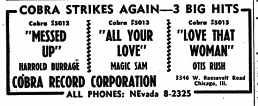
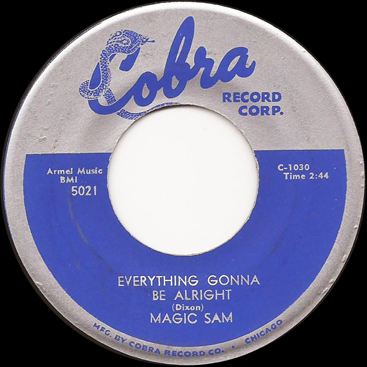
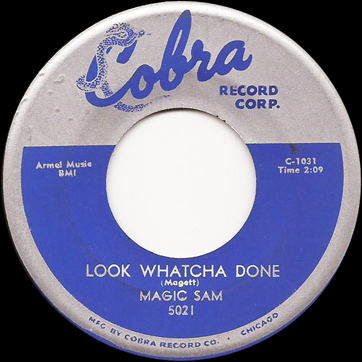
Negro Art M-12-SB-358, released around 1968, was part of a French blues anthology. It was titled Story of the Blues: Chicago Blues 1. Blue Horizon 7-63233, the first compilation of Magic Sam's Cobra sides, was released in Britain in December 1969, shortly after Magic Sam's early death. It was titled Magic Sam 1937-1969. Flyright FLY 561, Magic Rocker, was an LP released in Britain in 1980; it entirely replicated the contents of the Blue Horizon, but often used better-quality sources. P-Vine Special PLP-9011, Magic Sam: Out of Bad Luck, was released in Japan in 1980. P-Vine PCD-2123, likewise titled Magic Sam: Out of Bad Luck, but expanded to 26 tracks with the inclusion of post-Cobra recordings, was released in Japan in 1989. Flyright FLYCD02 and Paula PCD02, Magic Sam 1957-1966: West Side Guitar, a compilation of Sam's sides for Cobra, Artistic, Chief, and Crash, were released in 1989 and 1991, respectively. Chicago Boss Guitars: Otis Rush Buddy Guy Magic Sam was released in Britain on Flyright FLYCD 18 in 1991 and that same year in the United States on Paula PCD-9. P-Vine PCD 2346, Willie Dixon: Working on the Blues, Vol. 1, was released in Japan in 1992. P-Vine PCD 2350, Buddy Guy, Otis Rush & Magic Sam at the Cobra Studio 1956-58, was likewise released in Japan in 1992; it provided a warts-and-all treatment (all complete and incomplete takes plus studio chatter) for the items selected. P-Vine PCD 24062, Magic Sam: Out of Bad Luck - The Cobra, Chief & Crash Sessions 1957-1966, was released in Japan in 2001; half of the 28 tracks are from Cobra, with a slightly different choice of alternate takes compared to PCD-2123. Fuel 2000 302 061 104 is a CD released in the United States in 2001, under the title The Essential Magic Sam: The Cobra and Chief Recordings 1957-1961; among its 25 tracks are 10 released sides and 5 alternate takes from Cobra. .Fuel 2000 302 061 920, Magic Sam: All Your Love, is a CD released in 2012; it is restricted to the Cobra and Artistic sides.
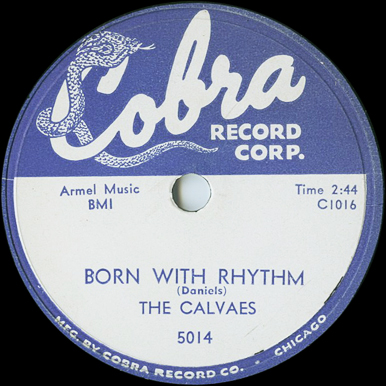
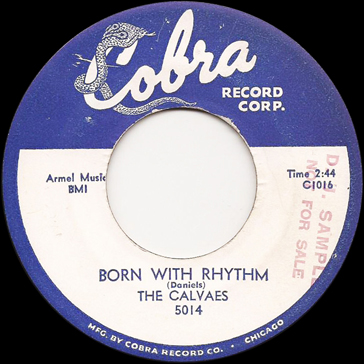
The Calvaes: James "Zeke" Brown, James Williams, Paul Morgan, Donald Coles, James Bailey (voc); unidentified (ts); unidentified (ts); unidentified (p); unidentified (eg); unidentified (b); unidentified (d, Latin perc).
Cobra Studio, Chicago, c. May 1957
| C1016 | Born with Rhythm (Daniels) | Cobra 5014, P-Vine [J] PCD 18529 | |
| C1017 | Lonely Lonely Village (Daniels) | Cobra 5014, P-Vine [J] PCD 18529, Fuel 2000 302 061 934 [CD], One Day DAY2CD204 |
Personnel for the Calvaes from Horner's 2009 article in Echoes of the Past #87; Horner draws, in turn, on Robert Pruter, "The James 'Zeke' Brown, The Calvaes and Accents Story," Blues & Rhythm, #218 (April 2007), pp. 10-11. James Brown sang the lead on both sides of Cobra 5014.
The sonics are definitely from Cobra Studio. Saxes are recessed on "Lonely Lonely Village," and the piano is out of tune. The guitar solo on "Born with Rhythm" will repay closer study.
The session is said to have taken place in the spring of 1957. Relying on a Galen Gart volume, Horner states that Cobra 5014 was reviewed on July 22, 1957. No such item can be found in that issue of Billboard, nor in the issues from a week earlier or a week later, so we will infer that a review appeared in Cash Box around this time. To be researched.
Zeke Brown left the Calvaes after the second Cobra release. Ted Daniels then put together a new lineup, which cut one single for Checker in 1958.
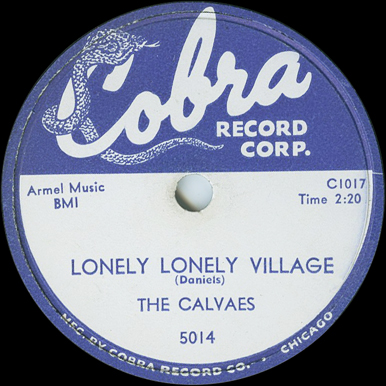
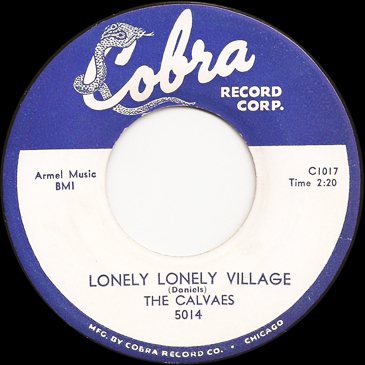
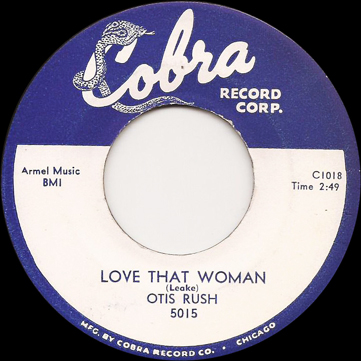
Otis Rush (voc, eg); Little Walter (hca); Harold Ashby (ts); Little Brother Montgomery (p); Willie Dixon (b); Odie Payne (d).
Cobra Studio, Chicago, c. May 1957
| C1018 | Love That Woman (Leake) | Cobra 5015, Negro Art [Fr] M-12-SB-358, Blue Horizon [Br] 7-63222, Epic ECPJ-19, Flyright [Br] FLY 560, P-Vine Special [J] PLP-9012, Flyright [Br] FLYCD01, P-Vine [J] PCD-2128, Paula PCD01, Capricorn 9-42012 [CD], P-Vine [J] PCD-24038, Fuel 2000 302 061 077 [CD], P-Vine [J] PCD 18529 | |
| C1019 | Jump Sister Bessie (Dixon) | Cobra 5015, Negro Art [Fr] M-12-SB-358, Blue Horizon [Br] 7-63222, Epic ECPJ-19, Flyright [Br] FLY 560, P-Vine Special [J] PLP-9012, Flyright [Br] FLYCD01, P-Vine [J] PCD-2128, Paula PCD01, Capricorn 9-42012 [CD], P-Vine [J] PCD-24038, Fuel 2000 302 061 077 [CD], P-Vine [J] PCD 18529 |
Cobra 5015 was first advertised in Billboard on June 24, 1957. In preparation for the NAMM convention, Cobra ran an ad for 5012, 5013, and 5015 in Cash Box on July 20, 1957 (p. 87). Although Fancourt and McGrath put Little Brother Montgomery at the piano bench, it may not be coincidential that on the label "Love That Woman" carries a composition credit to… Lafayette Leake. Subsequent sources have generally credited the tune to Otis Rush.
Negro Art M-12-SB-358 was part of a French LP anthology. Released around 1968, it was titled Story of the Blues: Chicago Blues 1. Flyright FLYCD01, Otis Rush: I Can't Quit You Baby, was released in Britain in 1989; Paula PCD01, its American counterpart, was titled Otis Rush 1956-1958, with a probable release date of 1990. P-Vine PCD-2128, Otis Rush: The Cobra Sessions 1956-1958, was released in Japan in 1989.
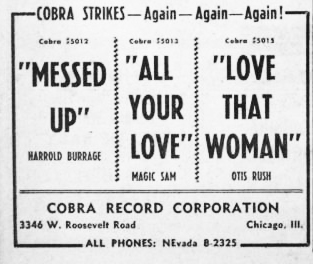
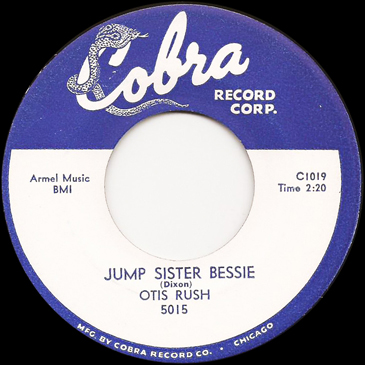
Lead guitar chores for the next session were entrusted to a visitor from Florida. Guitar Shorty was born David W. Kearney on August 9, 1934, in Polk County, Florida. He had been performing with regional bands for several years when Cobra signed him.
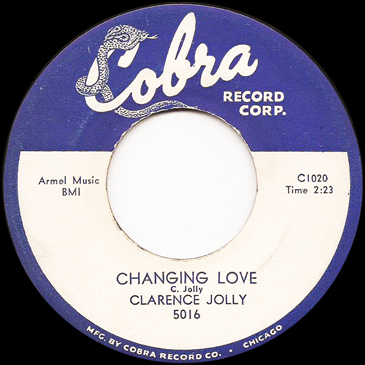
Clarence Jolly (voc); John Tinsley (ts); Lafayette Leake (p); David William Kearney aka Guitar Shorty (eg); unidentifed (eg); Willie Dixon (b); Odie Payne (d).
Cobra Studio, Chicago, c. June 1957
| C1020 | Changing Love (Jolly) | Cobra 5016, Flyright [Br] FLY 582, P-Vine Special [J] PLP-9027, P-Vine [J] PCD 24074, P-Vine [J] PCD 18529, One Day DAY2CD204 | |
| C1021 | Don't Leave Me (Jolly) | Cobra 5016, Flyright [Br] FLY 582, P-Vine Special [J] PLP-9027, P-Vine [J] PCD 24074, Fuel 2000 302 061 686 [CD], P-Vine [J] PCD 18529, Fuel 2000 302 061 934 [CD], One Day DAY2CD204 |
Basic information, except the month, from Fancourt and McGrath, who name only Jolly, Kearney, and Dixon. Another Cobra studio product, with drums that produce the same thud as can be heard on the Guitar Shorty items. Barwalking tenor sax is also similar (including a solo on "Don't Leave Me"). Neither Cobra 5016 nor Cobra 5017 was advertised or reviewed in Billboard.
P-Vine Special PLP-9027 was released in Japan in 1981 under the title Screamin' and Cryin'. P-Vine PCD 24074 was released in Japan in 2001 as Chicago Blues Guitar Killers!.
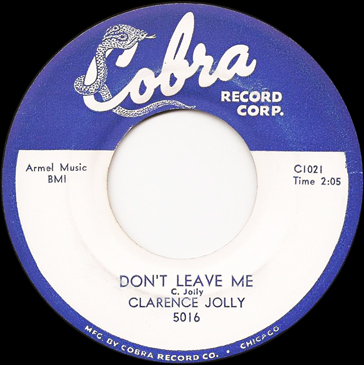
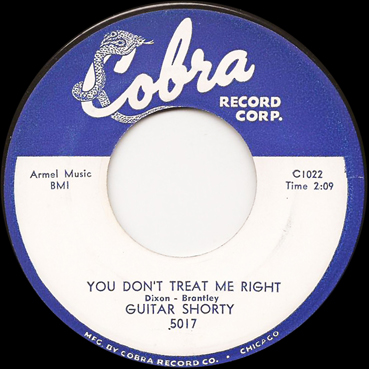
David William Kearney (eg, voc); John Tinsley (ts); Lafayette Leake (p); unidentified (eg); Willie Dixon (b); Odie Payne (d).
Cobra Studio, Chicago, c. June 1957
| C1022 | You Don't Treat Me Right (Dixon-Brantley) | Cobra 5017, Flyright [Br] FLY 582, P-Vine Special [J] PLP-9027, P-Vine [J] PCD 24074, P-Vine [J] PCD 18529, Fuel 2000 302 061 934 [CD], One Day DAY2CD204 | |
| C1023 | Irma Lee (Kearney) | Cobra 5017, Flyright [Br] FLY 582, P-Vine Special [J] PLP-9027, P-Vine [J] PCD 24074, Fuel 2000 302 061 686 [CD], P-Vine [J] PCD 18529 |
Session information, except the month, from Fancourt and McGrath. The sonics on "Irma Lee" and "You Don't Treat Me Right" certainly derive from Cobra Studio. John Tinsley, if that's who he his, gets a solo on "Irma Lee"; note also the barwalking bellowing on "You Don't Treat Me Right." Charles Brantley, who shared the composer credit for "You Don't Treat Me Right," led a band in Miami that Clarence Jolly had previously recorded with—and Guitar Shorty had also worked with.
Flyright FLY 582, Fishin' in My Pond: Chicago Blues Bands, was released in Britain in 1981. P-Vine Special PLP-9027, Screamin' and Cryin', is an LP released in Japan in 1981. P-Vine PCD 24074, Chicago Blues Guitar Killers!, came out in Japan in 2001.
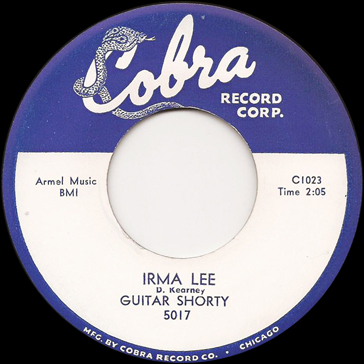
Guitar Shorty has enjoyed a long and varied career since this one session for Cobra.
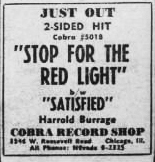
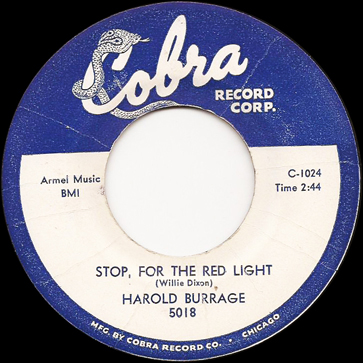
Harold Burrage (voc, p); Harold Ashby (ts); Lucius Washington (ts); poss. Otis Rush (eg); Willie Dixon (b); Bill Stepney (d).
Cobra Studio, Chicago, c. July 1957
| C1024-1 | Stop for the Red Light | Flyright [Br] FLY 579, P-Vine Special [J] PLP-9021, Westside [Br] WESM 634 [CD] | |
| C-1024-2 | Stop, for the Red Light (Dixon) | Cobra 5018, Westside [Br] WESM 634 [CD], P-Vine [J] PCD 18529, Fuel 2000 302 061 934 [CD], One Day DAY2CD204 | |
| C-1025-1 | Satisfied [I'm Satisfied*] | Flyright [Br] FLY 579*, P-Vine Special [J] PLP-9021*, Westside [Br] WESM 634 [CD] | |
| C-1025-2 | Satisfied (Dixon) | Cobra 5018, Flyright [Br] FLY 579, P-Vine [J] PCD 2346, Capricorn 9-42012 [CD], P-Vine [J] PCD 24074, Westside [Br] WESM 634 [CD], Fuel 2000 302 061 138 [CD], P-Vine [J] PCD 18529 | |
| Hey Little Girl | unissued |
Session particulars, except the month, are from Fancourt and McGrath. But they miss the second tenor sax... and the saxophone solo on "Satisfied" sounds like the work of Lucius Washington, not Harold Ashby. The soloist on "Stop" does appear to be Harold Ashby. Intrusive car-accident sound effects were added to C1024-2 for release on Cobra 5018.
Cobra 5018 was first advertised in Billboard on August 19, 1957. Billboard gave the single a poor review in the next week's issue, from August 26.
The sonics are remarkably good for a Cobra Studio outing, if that's what this was.
Flyright FLY 579, Harold Burrage: She Knocks Me Out, was released in 1981. P-Vine PCD 24074, Chicago Blues Guitar Killers!, was released in Japan in 2001. Westside WESM 634, Harold Burrage: Messed Up!, was a CD released in Britain in 2001.
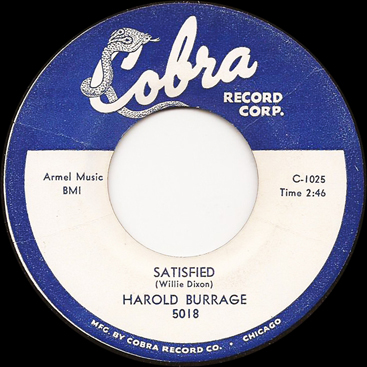
From 5000 through 5018, all Cobras, whether on 78 or on 45 rpm, used the same blue on white label design. In August 1957, the one-year-old company made a change in the color scheme. The new label design was developed for 45s and then fitted to 78s, instead of the other way around. The first new color scheme was silver on black, used for Cobra 5019 and 5020, but then Cobra 5021 and 5022 were silver on blue. Cobra 5023 briefly tried a silver on red scheme, but from 5024 through 5032 the company reverted to silver on blue. For reasons unknown to us, Cobra 5033 went all the way back to silver on black.
Betty Everett was born in Greenwood, Missisippi, on November 23, 1939. She arrived in Chicago when she was 17. The story goes that Magic Sam invited her up on the bandstand to sing. Not much more was required to bring her to the attention of Messrs. Toscano, Bedno, and Dixon.
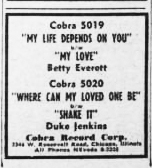
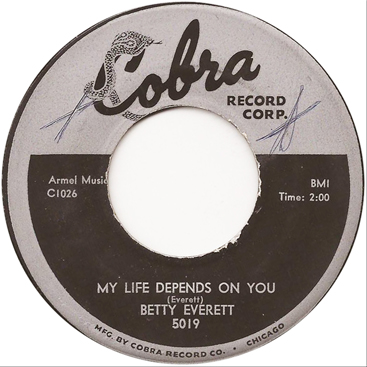
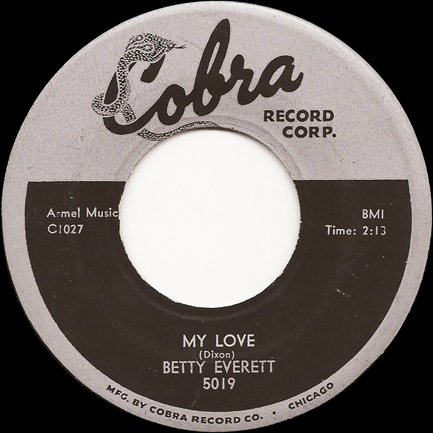
Betty Everett (voc); unidentified (tb -2); Harold Ashby (ts); poss. Red Holloway (ts); Little Brother Montgomery (p); Wayne Bennett (eg); Willie Dixon (b); Bill Stepney (d); unidentified males (bg voc -1).
Sheldon (Chess) Studio, Chicago, August 1957
| C1026 | My Life Depends on You (Everett) -1 | Cobra 5019, Flyright [Br] FLY 589, P-Vine [J] PCD-24050, Fuel 2000 302 061 686 [CD], P-Vine [J] PCD 18529 | |
| C1027 | My Love (Dixon) -1 | Cobra 5019, Flyright [Br] FLY 589, P-Vine [J] PCD 2161, Capricorn 9-42012 [CD], P-Vine [J] PCD-24050, Fuel 2000 302 061 138 [CD], Fuel 2000 302 061 686 [CD], P-Vine [J] PCD 18529, Fuel 2000 302 061 934 [CD], One Day DAY2CD204 | |
| C1036 | Ain't Gonna Cry (Everett) | Cobra 5024, Flyright [Br] FLY 589, P-Vine [J] PCD 2161, Capricorn 9-42012 [CD], P-Vine [J] PCD-24050, P-Vine [J] PCD 18530, Fuel 2000 302 061 934 [CD], One Day DAY2CD204 | |
| C1037 | Killer Diller (Dixon) -2 | Cobra 5024, Flyright [Br] FLY 589, P-Vine [J] PCD 2161, P-Vine [J] PCD-24050, P-Vine [J] PCD 18530 | |
| C1037-10 | Killer Diller | Flyright [Br] FLY 589, P-Vine [J] PCD 2161, P-Vine [J] PCD-24050 | |
| I Want You | unissued |
Session information as per Fancourt and McGrath. The Capricorn box gives the location for Cobra 5019 as Sheldon Studio—and the location for Cobra 5024 as RCA Victor Studio… Willie Dixon is one of the male backup singers on "My Love." Obviously, more listening is called for. "Ain't Gonna Cry" includes a tenor sax solo by Harold Ashby; the Capricorn box marks it as an alternate take, but there don't appear to have been any... Same goes for "My Love" on the Capricorn box.
Cobra 5019 was advertised (along with Cobra 5020) in Billboard on September 30, 1957 (p. 60, along with Cobra 5020. The same joint ad ran in Billboard on October 7, 1957 (p. 68).
Cobra 5024 was reviewed in Billboard on August 18, 1958 (p. 65), breaking a long drought in coverage.
The tenor saxes are balanced better on this session than some of the others, but it's hard to know who the second tenorist was. Would Cobra have hired Red Holloway to do so little? And would Little Brother Montgomery have been called on to provide redundant piano triplets, as can be heard on both sides of Cobra 5019? Another unsolved mystery is the trombonist on "Killer Diller," who has escaped discographical mention up to now.
The first reissue of this material that we know of was Flyright FLY 589, an LP released in Britain in 1984, under the title Chicago Blues with Betty Everett & Lillian Offitt. Oddly, the 1990 Japanese release on P-Vine PCD 2161, Ike Turner's Kings of Rhythm: Cobra Sessions, 1958, includes four tracks from this session—which Turner had nothing to do with. The practice is carried forward on P-Vine PCD-24050, an Ike Turner compilation released in Japan in 2001 as Ike Turner's Kings of Rhythm: Down and Out The Cobra Sessions 1958-1959. The 2007 Cobra compilation CD Treasures from the Vaults (Fuel 302 061 686) includes both sides of Cobra 5019.
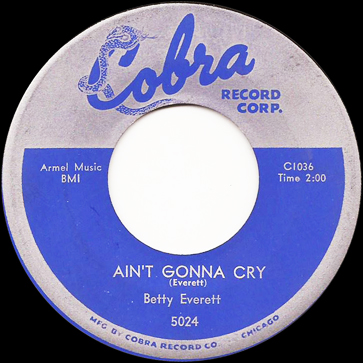
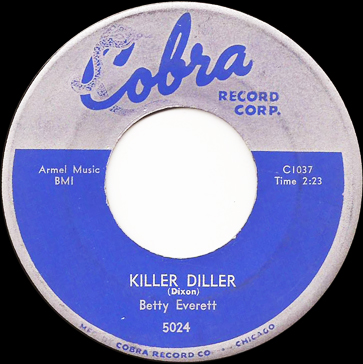
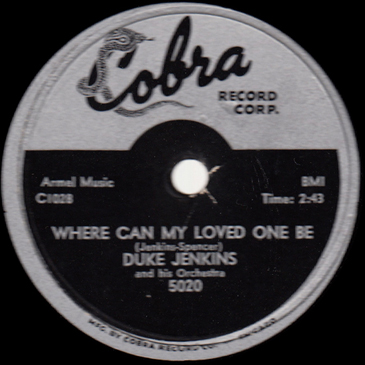
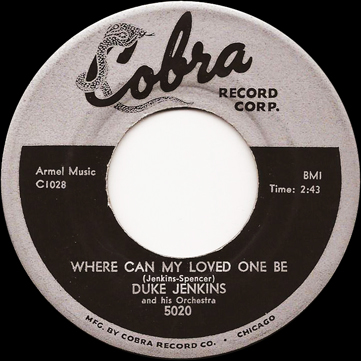
Duke Jenkins (p, voc); Freddie Jenkins (as, bars); Bill Parker (ts); Willie Lewis (eg); Curtis Wilder (b); John Brown or Archie Taylor (d, Latin perc).
Sheldon (Chess) Studio, Chicago, August 28, 1957
| C1028 | Where Can My Loved One Be (Jenkins-Spencer) | Cobra 5020, P-Vine [J] PCD 18529 | |
| C1029-1 | Shake It | Capricorn CD 9-42012 | |
| C1029-3 | Shake It (Jenkins) | Cobra 5020, P-Vine [J] PCD 18529, Fuel 2000 302 061 934 [CD], One Day DAY2CD204 |
A sheet from Sheldon Studio (the name that Chess used for outside work) listing these two titles is preserved among the meager surviving documentation from Cobra. The studio was around three months old at the time. The date is on the sheet.
Personnel from Fancourt and McGrath, who included Freddie Jenkins this time. Freddie plays baritone sax on "Shake It."
Cobra 5019 and 5020 were first advertised in Billboard on September 30, 1957 (p. 60). The ad was repeated on October 7 (p. 68).
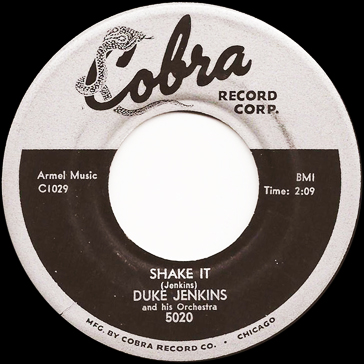
Did Cobra—which during its first year in business was considered important enough to feature on Billboard's weekly chart of the number of new releases by company—ever buy another ad in the trade paper?
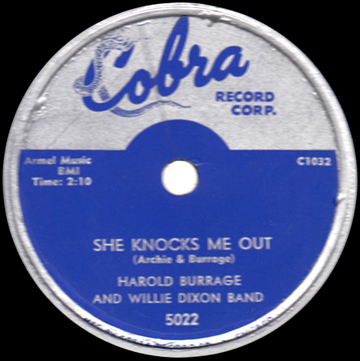
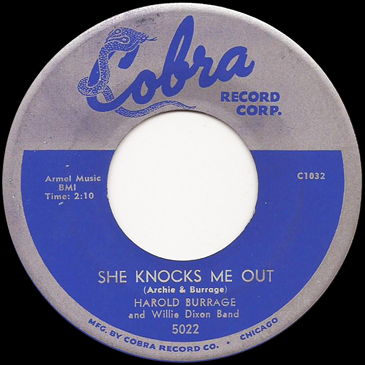
Cobra Studio, Chicago, late 1957
Harold Burrage (voc, p); Harold Ashby (ts); Mack Thompson (eg); Willie Dixon (b); Bill Stepney (d).
| C1032-1 | Crazy about My Baby [She Knocks Me Out] | P-Vine Special [J] PLP 9021, Westside [Br] WESM 634 [CD] | |
| C1032-2 | She Knocks Me Out (Archie & Burrage) | Cobra 5022, Faro 5030, Vivid 101, Flyright [Br] FLY 579, Westside [Br] WESM 634 [CD], P-Vine [J] PCD 18529, Fuel 2000 302 061 934 [CD], One Day DAY2CD204 | |
| C1033-1 | My Love Has Been in Vain | unissued | |
| C1033-2 | My Love Has Been in Vain | unissued | |
| C1033-3 | A Heart (Filled with Pain) (Archie & Burrage) | Cobra 5022, Faro 5030, Vivid 101, Flyright [Br] FLY 579, Westside [Br] WESM 634 [CD], P-Vine [J] PCD 18529 |
All session information from Fancourt and McGrath, except Ashby is present on both takes of "She Knocks Me Out." The rockin' tenor sax on this number is definitely his.
Eli Toscano was talking up Cobra 5021, 5022, and 5023 in the January 11, 1958 issue of Cash Box (p. 40). Cobra 5022 was reviewed in Billboard on January 13, 1958.
Flyright FLY 579, Harold Burrage: She Knocks Me Out, was released in Britain in 1981. Westside WESM 634 was a CD released in Britain in 2001, as Harold Burrage: Messed Up!.
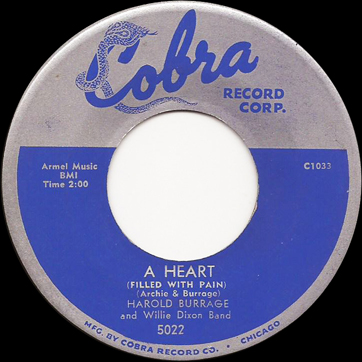
The Memphis Slim sides were done when the veteran blues pianist was in the midst of a dry spell, so far as recordings were concerned. Two productive years with United expired at the end of 1954. All he could get after that was one 1955 session for a small Los Angeles operation called Money. His Cobra session, just Slim with a little help from a drummer, was a tryout, one that evidently did not convince Toscano et al. to schedule a session for Slim's band. But it turned out there was no shortage of interest from other companies. On January 8, 1958, Slim cut his first session for Vee-Jay, a label he would return to in 1959—while also in demand from United Artists, Folkways, Verve, and Vanguard.
Memphis Slim (p, voc); unidentified (d -1).
Cobra Studio, Chicago, 1957
| I Wonder What's the Matter | Flyright [Br] FLY 577, Flyright [Br] FLYCD 31, Paula PCD-15, P-Vine [J] PCD 24076 | ||
| Best Gal I Ever Had | Flyright [Br] FLY 577, Flyright [Br] FLYCD 31, Paula PCD-15, P-Vine [J] PCD 24076 | ||
| I Can't Live without You -1 | Flyright [Br] FLYCD 31, Paula PCD-15, P-Vine [J] PCD 24076 | ||
| So Tired | Flyright [Br] FLYCD 31, Paula PCD-15, P-Vine [J] PCD 24076 | ||
| My Love Will Never Die | unissued |
"What's the Matter" ended up being the first title recorded on Slim's first Vee-Jay session. "My Love Will Never Die," if Fancourt and McGrath's listing is accurate, must have been an updated version of "Slim Was Just Kidding," featuring mimicry of other artists. Fancourt and McGrath, our main source for this session, also list "Got to Find My Walking Shoes" as a separate (unissued) title, but that phrase is a conspicuous part of "Best Gal I Ever Had."
Flyright FLY 577 was released in Britain in 1981 under the title Big Joe Williams, Memphis Slim, Little Brother Montgomery: Unissued Chicago Blues of the 50's from Cobra & JOB. Flyright FLYCD 31 and Paula PCD-15, Chicago Piano: 1951-1958 from Cobra & JOB, were released in 1989 and 1991, respectively. P-Vine PCD 24076 was released in Japan in 2001; the title, Chicago Blues Piano Hitters!, may sound better to non-native speakers of English.
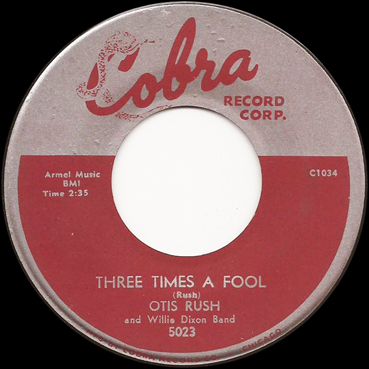
Otis Rush (eg, voc); Harold Ashby (ts); Lafayette Leake (p); Reggie Boyd (eg); Willie Dixon (b); Odie Payne (d).
Cobra Studio, Chicago, late 1957
| C1034 | Three Times a Fool (Rush) | Cobra 5023, Bluestown 778, Negro Art [F] M-12-SB-361, Flyright [Br] FLY 562, P-Vine Special [J] PLP-9012, Flyright [Br] FLYCD01, P-Vine [J] PCD-2128, Paula PCD01, Capricorn 9-42012 [CD], P-Vine [J] PCD-24038, Fuel 2000 302 061 077 [CD], P-Vine [J] PCD 18530, Fuel 2000 302 061 934 [CD], One Day DAY2CD204 | |
| C1034 [alt.] | Three Times a Fool | Blue Horizon [Br] 7-63222, Epic ECPJ-19, Flyright [Br] FLY 560, P-Vine Special [J] PLP-9013, Flyright [Br] FLYCD 18, Paula PCD-9, P-Vine [J] PCD-24038, Fuel 2000 302 061 077 [CD] | |
| C1035 [tk. 4] | She's a Good 'Un | P-Vine Special [J] PLP-9013, Flyright [Br] FLY 594, Flyright [Br] FLYCD 18, Paula PCD-9, P-Vine [J] PCD-24038, Fuel 2000 302 061 077 [CD] | |
| C1035 | She's a Good-'Un (Eskridge - White) | Cobra 5023, Negro Art [F] M-12-SB-361, Flyright [Br] FLY 562, P-Vine Special [J] PLP-9012, Capricorn 9-42012 [CD], P-Vine [J] PCD-24038, Fuel 2000 302 061 077 [CD], P-Vine [J] PCD 18530 | |
| C1035 [tk. A] | She's a Good 'Un | Blue Horizon [Br] 7-63222, Epic ECPJ-19, Flyright [Br] FLY 560, Flyright [Br] FLYCD01, P-Vine [J] PCD-2128, Paula PCD01 | |
| C1035 [tk. B] | She's a Good 'Un | Blue Horizon [Br] 7-63222, Epic ECPJ-19, Flyright [Br] FLY 560, P-Vine Special [J] PLP-9013, Flyright [Br] FLYCD01, P-Vine [J] PCD-2128, Paula PCD01 |
Session and basic release information from Fancourt and McGrath. There is definitely just one tenor sax on this session.
Cobra 5023 was reviewed in Cash Box on January 11, 1958 (p. 38).
Negro Art M-12-SB-361, Story of the Blues: Chicago Blues 2, was an LP released in France, around 1968. P-Vine Special PLP-9013, Otis Rush: Cobra Alternates, was released in Japan in 1980. Flyright FLYCD01, Otis Rush: I Can't Quit You Baby, was released in Britain in 1989, followed by Paula PCD01, Otis Rush 1956-1958, in the United States most likely in 1990. According to the notes to Flyright FLYCD 18 and Paula PCD-9, Chicago Boss Guitars, the versions of "Three Times a Fool" and "She's a Good 'Un" on these CDs are both alternate takes. P-Vine PCD-24038, Otis Rush: I Can't Quit You Baby, was released in Japan in 2001, while Fuel 2000 302 061 077, The Essential Otis Rush, was released in the United States in 2001.
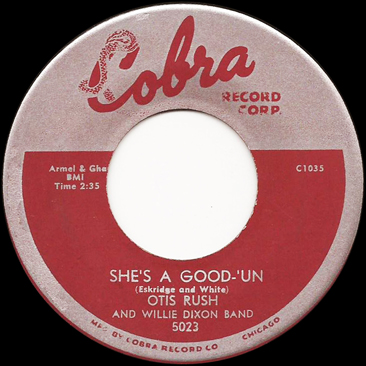
One of the sessions that is hard to place featured the itinerant bluesman Big Joe Williams, whose last released studio outing had been for Vee-Jay on October 16, 1956. A little later, his first session for Delmark took place in St. Louis, but was held back (in fact, has never been issued to this day) because the Vee-Jay contract was still in force. Another session, in Chicago on September 1 and 3, 1957, was done for an unidentified company and not released for some years, when it appeared on a British EP. Cobra recorded Williams with his 9-string guitar and an unidentified pianist—some think it's Erwin Helfer—accompanying on everything but one take of "Baby Please Don't Go". This may all have been meant as an audition, but 10 tracks were recorded. Cobra did nothing with them. In January and February 1958, Williams was again in St. Louis, recording prolifically for Delmark.
Big Joe Wiliams (9-string g, voc); prob. Erwin Helfer (p except -1).
Cobra Studio, Chicago, between October 1957 and January 1958
| Cottage Grove | P-Vine [J] PLP 9014, Flyright [Br] FLY 577 | ||
| Meet Me in the Bottom | P-Vine [J] PLP 9014, Flyright [Br] FLY 577 | ||
| Bessemer Baby | P-Vine [J] PLP 9014, Flyright [Br] FLY 577 | ||
| tk. 1 | Baby Please Don't Go | P-Vine [J] PLP 9014, Flyright [Br] FLY 577 | |
| tk. 2 | Baby Please Don't Go -1 | P-Vine [J] PLP 9014, Flyright [Br] FLY 577 | |
| Highway 49 | P-Vine [J] PLP 9014, Flyright [Br] FLY 577 | ||
| Shake Your Boogie | P-Vine [J] PLP 9014, Flyright [Br] FLY 577 | ||
| Jump Baby Jump | P-Vine [J] PLP 9014, Flyright [Br] FLY 577 | ||
| Mean Mistreater | P-Vine [J] PLP 9014, Flyright [Br] FLY 577 | ||
| Prison Bound | Flyright [Br] FLY 577, P-Vine [J] PLP 9014 |
"Cottage Grove" refers to locations in Chicago. The two takes of "Baby Please Don't Go" are both short, and the second (without piano) follows immediately after the first.
P-Vine PLP-9014, an LP released in Japan in 1980, was titled Big Joe Williams & Sonny Boy Williamson No. 2. Flyright FLY 577 was released in Britain in 1981 under the title Big Joe Williams, Memphis Slim, Little Brother Montgomery: Unissued Chicago Blues of the 50's from Cobra & JOB. Unlike the Memphis Slim tracks, the Big Joe Williams sides have not drawn any known reissue interest on CD.
It gets murky where Cobra left off recording in 1957 and picked up again in 1958, but our estimate is 77 surviving tracks from 1957. 1957 releases ran from Cobra 5006 through Cobra 5020, for a total of 15.
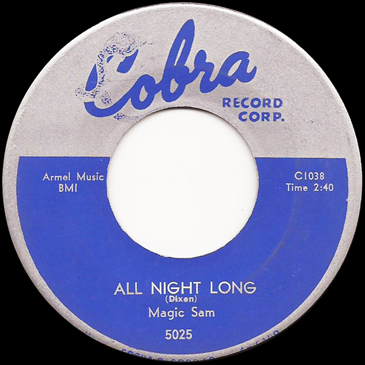
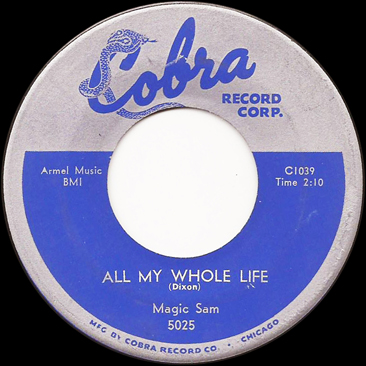
Magic Sam (eg, voc); Harold Burrage (p); Odell Campbell (eb); Willie Dixon (b); Odie Payne (d).
Cobra Studio, Chicago, c. March 1958
| C1038 | All Night Long (Dixon) | Cobra 5025, Flyright [Br] FLY 561, P-Vine PLP [J] PLP-9011, P-Vine [J] PCD-2123, Flyright [Br] FLYCD02, Paula PCD02, Capricorn 9-42012 [CD], P-Vine [J] PCD 24062, Fuel 2000 302 061 104 [CD], Fuel 2000 302 061 138 [CD], P-Vine [J] PCD 18530, Fuel 2000 302 061 920 [CD] | |
| C1039 | All My Whole Life (Dixon) | Cobra 5025, Flyright [Br] FLY 561, P-Vine PLP [J] PLP-9011, P-Vine [J] PCD-2123, Flyright [Br] FLYCD02, Paula PCD02, Capricorn 9-42012 [CD], P-Vine [J] PCD 24062, Fuel 2000 302 061 104 [CD], P-Vine [J] PCD 18530, Fuel 2000 302 061 920 [CD], Fuel 2000 302 061 934 [CD], One Day DAY2CD204 | |
| Love Me This Way | Blue Horizon [Br] 7-63223, Flyright [Br] FLY 561, P-Vine PLP [J] PLP-9011, P-Vine [J] PCD-2123, Flyright [Br] FLYCD02, Paula PCD02, P-Vine [J] PCD 24062, Fuel 2000 302 061 104 [CD], Fuel 2000 302 061 920 [CD] | ||
| C1054 [2 tests] | Easy Baby | Flyright [Br] FLY 562, P-Vine [J] PCD 2350 | |
| C 1054-1 with fs | Easy Baby (Dixon) | Cobra 5029 [edited], Negro Art [Fr] M-12-SB-358 [edited], Flyright [Br] FLY 562, Flyright [Br] FLYCD02, Paula PCD02, Flyright [Br] FLYCD 18, Paula PCD-9, P-Vine [J] PCD 2350, P-Vine [J] PCD 24062, Fuel 2000 302 061 104 [CD], Fuel 2000 302 061 138 [CD], P-Vine [J] PCD 18530, Fuel 2000 302 061 920 [CD], Fuel 2000 302 061 934 [CD], One Day DAY2CD204 | |
| C1054-2 [inc] | Easy Baby | Flyright [Br] FLY 562, P-Vine [J] PCD 2350 | |
| C1054-3 | Easy Baby | Blue Horizon [Br] 7-63223, Flyright [Br] FLY 561, P-Vine PLP [J] PLP-9011, P-Vine [J] PCD-2123, P-Vine [J] PCD 2350, P-Vine [J] PCD 24062, Fuel 2000 302 061 104 [CD] | |
| C1054-4 | Easy Baby | Flyright [Br] FLY 562, P-Vine [J] PCD-2123, P-Vine [J] PCD 2350 | |
| C1054-5 | Easy Baby | Flyright [Br] FLY 562, P-Vine [J] PCD-2123, P-Vine [J] PCD 2350 | |
| C 1055 | 21 Days in Jail (Dixon & Weaver) | Cobra 5029 [edited], Blue Horizon [Br] 7-63223 [edited], Flyright [Br] FLY 561, P-Vine PLP [J] PLP-9011, P-Vine [J] PCD-2123, Flyright [Br] FLYCD02, Paula PCD02, Flyright [Br] FLYCD 18, Paula PCD-9, P-Vine [J] PCD 2350, P-Vine [J] PCD 24062, Fuel 2000 302 061 104 [CD], P-Vine [J] PCD 18530, Fuel 2000 302 061 920 [CD] | |
| C1055 [tk. B] | 21 Days in Jail | Flyright [Br] FLY 562, P-Vine [J] PCD-2123, Flyright [Br] FLYCD 18, Paula PCD-9, P-Vine [J] PCD 2350, Capricorn 9-42012 [CD], Fuel 2000 302 061 104 [CD] |
Between January and August 1958, with Cobra 5023 to one side and Cobra 5024 and Artistic 1500 to the other, we have not found evidence from the trade papers of any new releases by the company—and not much news of any other kind.
However, the "R&B Ramblings" for Chicago (Cash Box, March 8, 1958, p. 48), mention Toscano promoting Cobra 5022 and 5023 as hits for his company; "Eli is prepping Magic Sam for a session very shortly."
So we are going with March 1958 as the most likely month for this session.
Cobra 5025 and 5029 are listed in Fancourt and McGrath as products of a single session; on this they follow the liners to Flyright FLY 562. The wave of Billboard and Cash Box reviews in January 1958 was followed by a long trough. The hiatus ended in August, with reviews of Cobra 5024, 5026, and 5027, but Cobra 5025 was never among the items advertised or reviewed in the trade paper. We infer that 5025 was released during the summer. Cobra 5029 was reviewed in Billboard on November 24, 1958, and in Cash Box on November 29 (p. 44).
"21 Days in Jail" as released on Cobra 5029 was shortened by an entire verse and chorus; the full version appeared on Flyright [Br] FLY 561 and subsequent reissues.
Negro Art M-12-SB-358 was released in France around 1968, as Story of the Blues: Chicago Blues 1. Blue Horizon 7-63223, Magic Sam 1937-1969, was released in 1969. Flyright FLY 562, Otis Rush & Magic Sam: The Other Takes 1956-58, was issued in Britain in 1980. The back liners sort out which takes were released on FLY 560 and FLY 561, each of which largely replicated previous releases on Blue Horizon. P-Vine PLP-9011, Magic Sam: Out of Bad Luck, was released in Japan in 1980; it consisted of 13 tracks, not including the Shakey Jake Artistics or any Cobra alternates. P-Vine PCD-2123, Magic Sam: Out of Bad Luck, was released in Japan in 1989; it adds alternate takes from the Cobra sessions, including studio conversation from "Easy Baby" and "21 Days in Jail," and a mass of post-Cobra material to extend to 26 tracks. Flyright FLYCD02 and Paula PCD-02, Magic Sam: West Side Guitar, were released in Britain and the United States, in 1989 and 1991 respectively. P-Vine PCD 2350, Buddy Guy, Otis Rush & Magic Sam at the Cobra Studio, 1956-58, was released in Japan in 1992.
Flyright FLY 562 includes both take 4 and take 5 of "Easy Baby." One of these was used on Capricorn 9-42012.
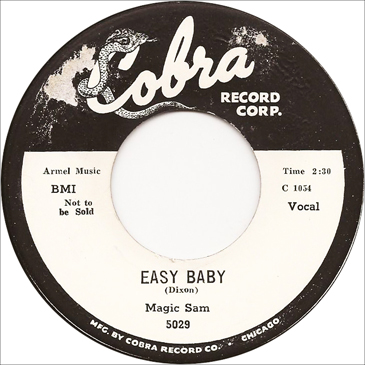
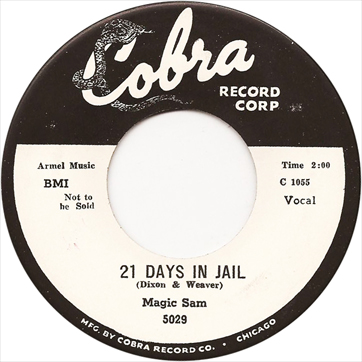
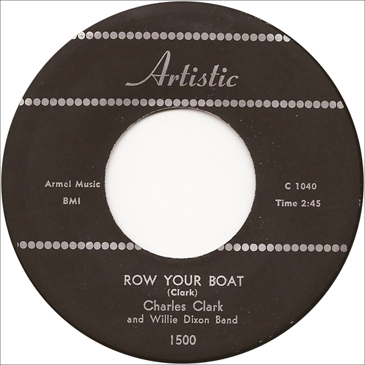
Charles Clark (voc); Aleck Miller aka Sonny Boy Williamson (hca); Harold Burrage (p); Otis Rush (eg); Louis Myers (eg); Willie Dixon (b); Bill Stepney (d).
Cobra Studio, Chicago, c. March 1958
| fs, inc tks | Row Your Boat | Flyright [Br] FLY 594 | |
| C 1040-1 | Row Your Boat | Flyright [Br] FLY 567, P-Vine Special [J] PLP-9026, P-Vine [J] PCD 24075 | |
| C 1040-2 | Row Your Boat | Flyright [Br] FLY 567, P-Vine Special [J] PLP-9026, Capricorn 9-42012 [CD], P-Vine [J] PCD 24075 | |
| C 1040-3 | Row Your Boat (Clark) | Artistic 1500, Red Lightnin' RL 005, Flyright [Br] FLY 579, Flyright [Br] FLYCD 11, Paula PCD-7, P-Vine [J] PCD 24074, P-Vine [J] PCD 18531 | |
| C 1041 | Hidden Charms (Dixon) | Artistic 1500, Red Lightnin' RL 005, Flyright [Br] FLY 579, P-Vine [J] PCD 24075, Fuel 2000 302 061 138 [CD], P-Vine [J] PCD 18531, Fuel 2000 302 061 934 [CD] |
Personnel as per Fancourt and McGrath. Artistic 1500 was reviewed in Billboard (or so we assume from the relevant Gart volume) on August 25, 1958. It was reviewed in Cash Box on August 30 (p. 38). The sound is awfully clean for Cobra Studio—maybe because the guitar amplifiers were turned down? The solos by Sonny Boy are a treat.
From the Cash Box clue about the second Magic Sam session, we are inferring that this session took place around the same time, or slightly later.
Red Lightnin' RL 005, Blues in D Natural, was an LP released in 1970. Flyright FLY 567, King Cobras: Chicago Kings of the Harmonica, was released in Britain in 1980. Flyright FLY 579, Harold Burrage: She Knocks Me Out, was released in Britain in 1981. P-Vine Special PLP-9026, Chicago Blues Session before Sunrise, was released in 1981; it identifies takes 1 and 2 of "Row Your Boat" as takes A and B. Material from two Artistic sessions takes up Side A of the P-Vine LP; Side B is Chess and Checker material. Flyright FLYCD 31 and Paula PCD-15, Chicago Piano: 1951-1958 from Cobra & JOB, are CDs released in 1990 and 1991. One of the two complete alternate takes of "Row Your Boat" was used on them, but the notes (at least to the Paula CD) do not indicate which one. P-Vine PCD 24074, Chicago Blues Guitar Killers!, came out in Japan in 2001, as did P-Vine PCD 24075, Chicago Blues Harp Blowers!
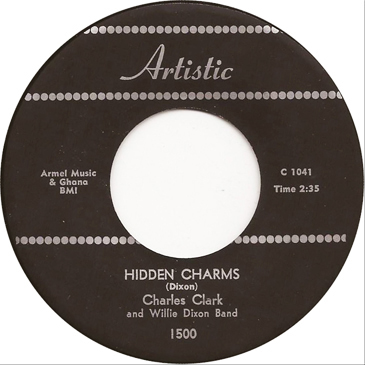
Sonny Boy Williamson (hca, voc); Harold Burrage (p -1); Willie Dixon (b).
Cobra Studio, Chicago, c. March 1958
| Steady Rollin' Man | Flyright [Br] FLY 567, P-Vine Special [J] PLP-9014, Flyright [Br] FLYCD 11, Paula PCD-7, P-Vine [J] PCD 24075 | ||
| Take Your Hands out of My Pocket (Williamson) -1 | Flyright [Br] FLY 567, P-Vine Special [J] PLP-9014, Flyright [Br] FLYCD 11, Paula PCD-7, P-Vine [J] PCD 24075 |
All session information, except for the month, from Fancourt and McGrath. From the same session as the Charles Clark sides, these tracks obviously couldn't be released on Cobra—because Sonny Boy was under contract to Checker, where he would remain through 1963.
Flyright FLY 567, King Cobras: Chicago Kings of the Harmonica, was released in Britain in 1980. P-Vine Special PLP-9014, Big Joe Williams & Sonny Boy Williamson No. 2, was released in Japan in 1981. P-Vine [J] PCD 24075, Chicago Blues Harp Blowers!, came out in 2001.
Buddy Guy's first session for Artistic completed the Cobra guitar triumvirate. George Guy was born in the small village of Lettsworth, Louisiana, on July 30, 1936. He learned how to play the diddley bow, then the guitar, as a child, and by the early 1950s was performing with bands in Baton Rouge. In 1957, he came to Chicago and quickly established himself on the West Side. Cobra signed him at some point in 1958 (the month remains in question).
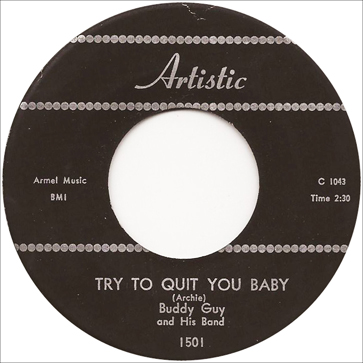
George "Buddy" Guy (eg, voc); Harold Ashby (ts); Bobby Neely (ts); McKinley Easton (bars); Harold Burrage (p); Otis Rush (eg); Willie Dixon (b); Odie Payne (d).
Cobra Studio, Chicago, c. March 1958
| C 1042 | Sit and Cry (The Blues) (Dixon) | Artistic 1501, Red Lightnin' RL 001, Flyright [Br] FLY 582, P-Vine Special [J] PLP-9024, Flyright [Br] FLYCD 18, Paula PCD-9, P-Vine [J] PCD 2346, Capricorn 9-42012 [CD], P-Vine [J] PCD-24039, Fuel 2000 302 061 138 [CD], P-Vine [J] PCD 18531, Fuel 2000 302 061 934 [CD] | |
| C 1043 | Try to Quit You Baby ("Archie") | Artistic 1501, Red Lightnin' RL 001, Flyright [Br] FLY 582, P-Vine Special [J] PLP-9024, Flyright [Br] FLYCD 18, Paula PCD-9, P-Vine [J] PCD 2346, Capricorn 9-42012 [CD], P-Vine [J] PCD-24039, P-Vine [J] PCD 18531 |
Recording personnel are from Fancourt and McGrath. However, they put Bobby Neely on "Try to Quit" and Mac Easton on "Sit and Cry," when the baritone sax is clearly audible on both, just not so far forward on "Try to Quit." Artistic 1501 was reviewed in Billboard (or so we gather from the relevant Gart volume) on August 25, 1958.
According to the notes to Flyright FLY 582, Otis Rush played all of the guitar on this session and Buddy Guy was present as a vocalist only.
It should be noted that in his interview for the Capricorn set, Guy couldn't say which month it was, but remembered that the weather was very cold! Yet Fancourt and McGrath put the recording date around August 1958. Our best guess is that this session rather promptly followed those by Magic Sam and Charles Clark, which would put it in March 1958 (during which there were plenty of opportunities for cold weather in Chicago). Guy's memory of the musicians on this session was extremely detailed.
Red Lightnin' RL 001, Buddy Guy: In the Beginning, is an LP released in 1969. Flyright FLY 582, Fishin' in My Pond: Chicago Blues Bands, was released in 1981. P-Vine Special [J] PLP-9024 is part of a 4-LP box, 9022/9025, issued in Japan in 1981 under the title Chicago Blues: A Quarter Century. Chicago Boss Guitars: Otis Rush Buddy Guy Magic Sam was released as Flyright FLYCD 18 in Britain in 1991 and as Paula PCD-9 in the United States, also in 1991. P-Vine PCD 2346, Willie Dixon: Working on the Blues, Vol. 1, was released in Japan in 1992. P-Vine PCD-24039, Buddy Guy: This Is the Beginning—The Artistic & U.S.A. Sessions 1958-1963, was released in Japan in 2001. Of the 16 tracks on the CD, just 6 came from Guy's Artistic sessions.
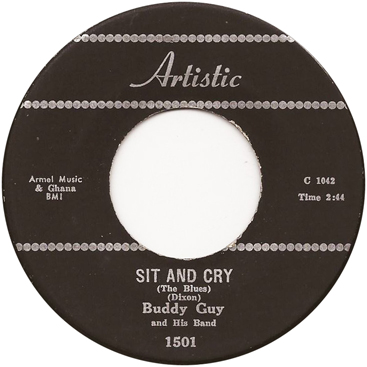
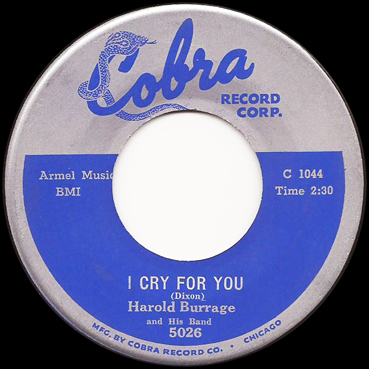
Harold Burrage (voc); Harold Ashby (ts); Abb Locke (ts); Henry Gray (p); Otis Rush (eg); Willie Dixon (b); Odie Payne (d).
Cobra Studio, Chicago, 1958
| C1044-1 | I Cry for You | P-Vine Special [J] PLP 9021, Flyright [Br] FLY 594, Capricorn 9-42012 [CD], Westside [Br] WESM 634 [CD] | |
| C 1044-2 | I Cry for You (Dixon) | Cobra 5026, Vivid 102, Flyright [Br] FLY 579, P-Vine [J] PCD 2346, Westside [Br] WESM 634 [CD], P-Vine [J] PCD 18530 | |
| C 1045 | Betty Jean (Archie & Hankins) | Cobra 5026, Vivid 102, Flyright [Br] FLY 579, Westside [Br] WESM 634 [CD], P-Vine [J] PCD 18530, Fuel 2000 302 061 934 [CD], One Day DAY2CD204 |
This session took place sometime between March and July 1958. There's nothing more for us to go on.
Information from Fancourt and McGrath. More wild rockin' tenor from Harold Ashby, on "Betty Jean." Cobra 5026 was reviewed in Cash Box on August 30 (p. 38). In fact, it got an "Award o' the Week" there.
Vivid 102 was released in 1964, on a short-lived Vee-Jay subsidiary. New matrix numbers were applied on this occasion, and the music publisher was listed as Conrad (Vee-Jay's house operation).
Flyright FLY 579, Harold Burrage: She Knocks Me Out, was released in Britain in 1981.
Toscano was still talking a good game as the new year rolled around. Interviewed by Cash Box, he proclaimed, "We have many Rock and Roll artists under contract, and their popularity has not wavered despite the pessimism voiced by other record people" ("Debunks Lag in R&R Sales," January 3, 1959, p. 32). He mentioned the Rockabeats as Cobra artists, but also Hayden Thompson and Mack Vickery, who made no recordings for him that we know of. He padded by counting Otis Rush, Buddy Guy, and Magic Sam as both R&B and rock and roll artists. Toscano also announced "semi-spiritual records" by Harold Burrage.
Obviously nothing happened on the semi-spiritual front, because Burrage left Cobra to sign with Vee-Jay, making his first session for that label on March 20, 1959. On April 4, Cash Box's Record Ramblings simply noted that "Vee-Jay pacted Harold Burrage t'other day" (p. 29).
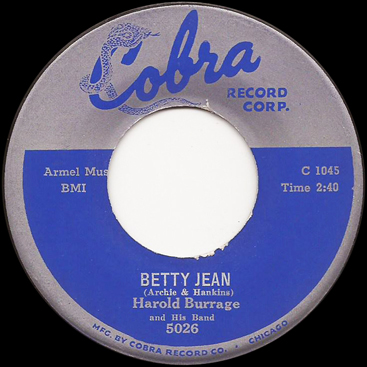
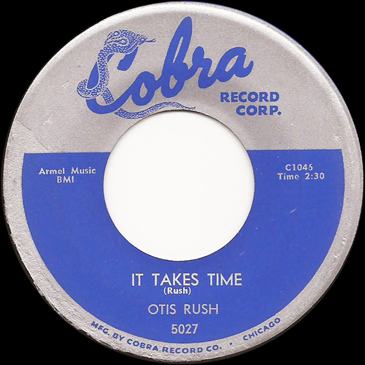
Otis Rush (eg, voc); Harold Ashby (ts); poss. McKinley Easton (bars); Little Brother Montgomery (p); Louis Myers (eg); Willie Dixon (b); Fred Below (d).
Cobra Studio, Chicago, 1958
| C1046 | It Takes Time (Rush) | Cobra 5027, Negro Art [Fr] M-12-SB-358, Blue Horizon [Br] 7-63222, Epic ECPJ-19, Flyright [Br] FLY 560, P-Vine Special [J] PLP-9012, Flyright [Br] FLYCD01, P-Vine [J] PCD-2128, Paula PCD01, Capricorn 9-42012 [CD], P-Vine [J] PCD-24038, Fuel 2000 302 061 077 [CD], P-Vine [J] PCD 18530, Fuel 2000 302 061 934 [CD], One Day DAY2CD204 | |
| C1047 | Checking on My Baby (Rush) | Cobra 5027, Negro Art [Fr] M-12-SB-358, Blue Horizon [Br] 7-63222, Epic ECPJ-19, Flyright [Br] FLY 560, P-Vine Special [J] PLP-9012, Flyright [Br] FLYCD01, P-Vine [J] PCD-2128, Paula PCD01, Capricorn 9-42012 [CD], P-Vine [J] PCD-24038, Fuel 2000 302 061 077 [CD], P-Vine [J] PCD 18530 |
This session took place sometime between March and July 1958. As with the previous one, there's nothing more for us to go on.
Personnel as per Fancourt and McGrath, though they don't mention the baritone saxophone. The bari's role is too restricted to allow for positive identification, but Mac Easton did a lot of session work in those days, and had been on the first Buddy Guy session. Cobra 5027 was reviewed in Billboard on August 18, 1958 (p. 65); along with the review of 5024, this was Billboard's first notice about the label in months. Cash Box reviewed 5027 on August 30, 1958 (p. 38). 5027 was listed in "Territorial Tips" for St. Louis (this may well have been in Cash Box) for the week of October 6, 1958.
Negro Art M-12-SB-358 was released in France around 1968, as Story of the Blues: Chicago Blues 1.
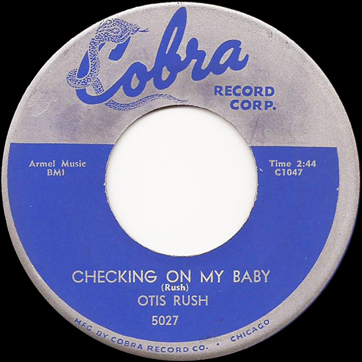
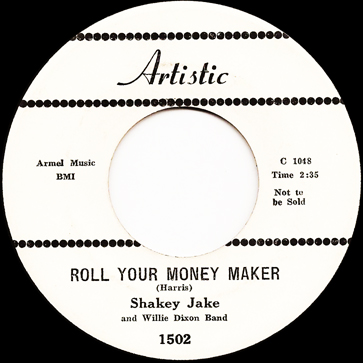
James "Shakey Jake" Harris (voc); Magic Sam (eg); Freddy King (eg); unidentified (p); Odell Campbell (eb); Willie Dixon (b); Junior Blackmon (d).
Cobra Studio, Chicago, 1958
| C 1048 | Roll Your Money Maker (Harris) | Artistic 1502, Vivid 100, Blue Horizon [Br] 7-63223, Flyright [Br] FLY 561, P-Vine [J] PCD-2123, Paula PCD02, Capricorn 9-42012 [CD], P-Vine [J] PCD 24062, Fuel 2000 302 061 686 [CD], P-Vine [J] PCD 18531, Fuel 2000 302 061 920 [CD] | |
| C 1049 | Call Me (If You Need Me) (Harris) | Artistic 1502, Vivid 100, Blue Horizon [Br] 7-63223, Flyright [Br] FLY 561, P-Vine Special [J] PLP-9024, P-Vine [J] PCD-2123, Paula PCD02, Capricorn 9-42012 [CD], P-Vine [J] PCD 24062, P-Vine [J] PCD 18531, Fuel 2000 302 061 920 [CD], Fuel 2000 302 061 934 [CD] |
We don't know the month for this session; in fact, we don't have a firm release date on Artistic 1502.
Shakey Jake apparently didn't bring his harmonica to this session, which has ended up on nearly every Magic Sam reissue package. Personnel as per Fancourt and McGrath, except they don't credit the piano, which is clearly audible on both sides. "Roll Your Moneymaker" relies heavily on ensemble vocals. The Capricorn box notes put Magic Sam and Syl Johnson on the guitars and Odie Payne in the drum chair.
The first reissue of these sides was on 45 rpm on Vivid, a short-lived Vee-Jay subsidiary, in 1964. According to Johnny Hoodoo, Vivid 100 actually used the same stampers as Artistic: on "Roll Your Moneymaker," C 1048 is crossed out in the trall-off area.
P-Vine Special [J] PLP-9024 is part of a 4-LP box, 9022/9025, issued in Japan in 1981 under the title Chicago Blues: A Quarter Century.
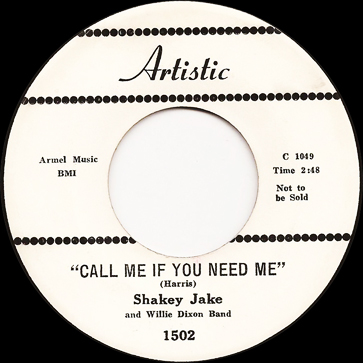
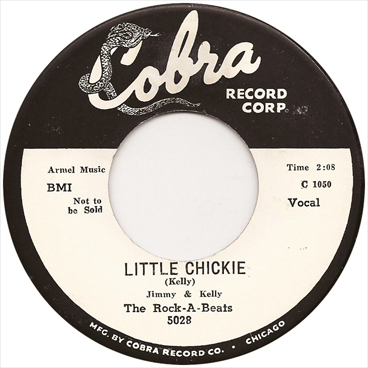
Jimmy Kelly (voc); unidentified (ts); unidentified (p); unidentified (eg); unidentified (b); unidentified (d).
Cobra Studio, Chicago, September or October 1958
| C 1050 | Little Chickie (Kelly) | Cobra 5028, P-Vine [J] PCD 18530, Fuel 2000 302 061 934 [CD], One Day DAY2CD204 | |
| C 1051 | Bonnie (Kelly) | Cobra 5028, P-Vine [J] PCD 18530 |
This session appears to be from the fall of 1958, though it would be nice to learn more.
Cobra 5028 is a pure rock and roll record, not listed in any blues discography. The Rock-a-Beats were the only white band to record for Cobra. Eli Toscano signed two more rock and roll acts, but it appears the company's downturn prevented him from recording anything by them. Instrumentation was identified by ear.
Cobra 5028 was reviewed in Cash Box on November 22, 1958 (p. 50) and Billboard on November 24, 1958.
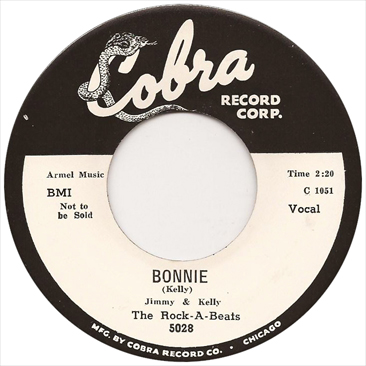
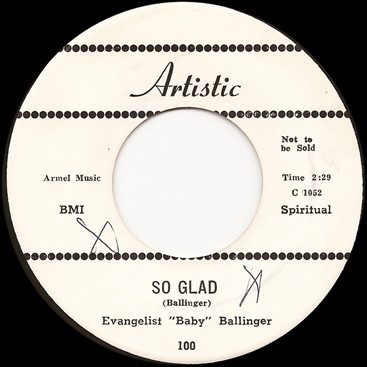
Rev. Robert Ballinger (voc, p); unidentified (b); unidentified (d).
Cobra Studio, Chicago, 1958
| C 1052 | So Glad (Ballinger) | Artistic 100, P-Vine [J] PCD 18530 | |
| C 1053 | Let It Be (Ballinger) | Artistic 100, P-Vine [J] PCD 18530 |
Personnel from Hayes and Laughlin's Gospel Discography. We don't have a firm release date or a recording date, though the release most likely took place in November or December 1958.
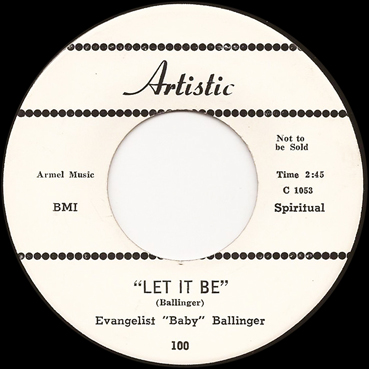
Although his contributions were not credited on the labels at first, Ike Turner made himself indispensable to Cobra and Artistic during the second half of 1958. The bandleader was born either Izear Luster Turner Jr. or Ike Wister Turner in Clarksdale, Mississippi, on November 5, 1931. He was the son of a preacher who died while he was still a boy. Ike received his first piano lessons from bluesman Pinetop Perkins. In the late 1940s, Turner was leading a big band called the Tophatters and a rhythm and blues unit called the Kings of Rhythm. It was the Kings of Rhythm who recorded in March 1951 for Sam Phillips in Memphis, on a session that was sold to Chess; it produced a hit for saxophonist Jackie Brenston in "Rocket 88." From 1952 through 1955, Turner was affiliated with Modern, though none of this precluded activity for other labels, including Chess and Checker, under the names of various of his sidemen. In 1953, Turner picked up the electric guitar, on which he gained proficiency at a startling rate. By 1955, he had moved to Saint Louis. In 1956 and 1957, Turner's band made a series of singles for Federal. In 1958, they were scuffling for recording opportunities, releasing a single on a tiny label called Royal American, selling another session to Sam Phillips, then taking up a semi-residency in Toscano's homemade studio. Among the key personnel in this version of Turner's band were Jackie Brenston, whose post-"Rocket 88" solo career had come to an end, and Tommy Hodge, a blues and soul shouter from Kenton, Missouri. Willie Dixon kept control over the proceedings, which explains why he replaced Turner's regular bass player, and Odie Payne replaced Billy Gayles on all but the "Walking Down the Aisle" session.
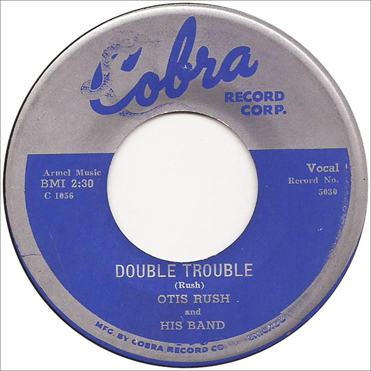
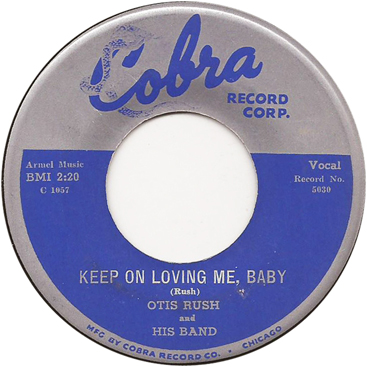
Otis Rush (eg, voc); Eddie Jones (ts); Carlson Oliver (ts); Jackie Brenston (bars); Harold Burrage or Little Brother Montgomery (p); Ike Turner (eg); Willie Dixon (b); Odie Payne (d).
Cobra Studio, Chicago, 1958
| C 1056 | Double Trouble (Rush)* | Cobra 5030, Negro Art [F] M-12-SB-361, Blue Horizon [Br] 7-63222, Epic ECPJ-19, Flyright [Br] FLY 560, P-Vine Special [J] PLP-9012, Flyright [Br] FLYCD01, P-Vine [J] PCD-2128, Paula PCD01, Flyright [Br] FLYCD 18, Paula PCD-9, Capricorn 9-42012 [CD], P-Vine [J] PCD-24038, Fuel 2000 302 061 077 [CD], P-Vine [J] PCD-24050, P-Vine [J] PCD 18530, Fuel 2000 302 061 934 [CD], One Day DAY2CD204 | |
| C1056 [tk. 2] | Double Trouble | Flyright [Br] FLY 562, P-Vine Special [J] PLP-9013, P-Vine [J] PCD-2128, P-Vine [J] PCD-24038 | |
| C1056 [tk. 3] | Double Trouble | P-Vine Special [J] PLP-9013, Flyright [Br] FLY 594, P-Vine [J] PCD-2128, P-Vine [J] PCD-24038, Fuel 2000 302 061 077 [CD] | |
| C1057 [tk. B] | Keep on Loving Me Baby | Blue Horizon [Br] 7-63222, Epic ECPJ-19, Flyright [Br] FLY 560, P-Vine [J] PCD 2350, P-Vine [J] PCD-24038 | |
| C1057 [alt.] | Keep on Loving Me Baby | Flyright [Br] FLY 560, P-Vine Special [J] PLP-9013, P-Vine [J] PCD 2350 | |
| C 1057 [tk. A] | Keep on Loving Me, Baby (Rush)* | Cobra 5030, Negro Art [F] M-12-SB-361, Blue Horizon [Br] 7-63222, Epic ECPJ-19, Flyright [Br] FLY 562, P-Vine Special [J] PLP-9012, Flyright [Br] FLYCD01, P-Vine [J] PCD-2128, Paula PCD01, Flyright [Br] FLYCD 18, Paula PCD-9, Flyright [Br] FLYCD 39, P-Vine [J] PCD 2350, Capricorn 9-42012 [CD], P-Vine [J] PCD-24038, Fuel 2000 302 061 077 [CD], P-Vine [J] PCD-24050, P-Vine [J] PCD 18530 | |
| C1064 | All Your Love (I Miss Loving) (Rush) | Cobra 5032, Negro Art [F] M-12-SB-367, Blue Horizon [Br] 7-63222, Epic ECPJ-19, Flyright [Br] FLY 560, P-Vine Special [J] PLP-9012, Flyright [Br] FLYCD01, P-Vine [J] PCD-2128, Paula PCD01, Capricorn 9-42012 [CD], P-Vine [J] PCD-24038, P-Vine [J] PCD 18530, Fuel 2000 302 061 934 [CD] | |
| C1065 | My Baby's a Good 'Un (Rush) | Cobra 5032, Negro Art [F] M-12-SB-367, Blue Horizon [Br] 7-63222, Epic ECPJ-19, Flyright [Br] FLY 560, P-Vine Special [J] PLP-9012, Flyright [Br] FLYCD01, P-Vine [J] PCD-2128, Paula PCD01, Capricorn 9-42012 [CD], P-Vine [J] PCD-24038, Fuel 2000 302 061 077 [CD], P-Vine [J] PCD 18530 |
There was another significant pause in Cobra's release schedule, between Cobra 5028 and 5029, in November 1958, and Cobra 5030, in March 1959, which makes this session hard to place.
Fancourt and McGrath put Cobra 5030 and 5032 on the same session. Personnel as per that source.
Cobra 5030 was reviewed in Billboard on March 2, 1959, and in Cash Box gave it an Award o' the Week on March 7 (p. 45). Cash Box also picked it as an R&B Sure Shot (March 21, 1959, p. 55). Although the company was visibly faltering, Cash Box reviewers continued to be highly supportive, right up to the final release. Flyright FLY 560 used the unedited master tape of C 1056; Cobra 5030 and the Blue Horizon release both edited it.
According to Keith Randall, Tom Ball, Craig Ruskey, and Chris Stovall Brown (at Real Blues Forum), on "Double Trouble," Otis Rush plays the introduction and the fills between vocal phrases, while Ike Turner, employing an abundance of whammy bar, is responsible for the remaining lead work.
Negro Art M-12-SB-361, Story of the Blues: Chicago Blues 2, was an LP released in France around 1968. Negro Art M-12-SB-367, Story of the Blues: Chicago Blues 3, was also an LP released in France around 1968. P-Vine Special PLP-9013, Otis Rush: Cobra Alternates, was released in Japan in 1980; on it, the take of "Keep on Loving Me, Baby" identified above as "alternate" is called take 2. Flyright FLYCD01, Otis Rush: I Can't Quit You Baby, was released in Britain in 1989; its US counterpart on Paula, PCD01, most likely appeared in 1990, as Otis Rush 1956-1958. Both contained an alternate take of "Double Trouble"—we're not sure which one. P-Vine PCD-2128, Otis Rush: The Cobra Sessions 1956-1958, was released in 1989; it leaves no such ambiguity, because it included both alternate takes of "Double Trouble." Flyright FLYCD 18 and Paula PCD-9, Chicago Boss Guitars, both released in 1991, include an alternate take of "Double Trouble" and an alternate take of "Keep on Loving Me Baby"—again, we are not sure which ones. Flyright FLYCD 39 was an Ike Turner CD, released in Britain in 1991. P-Vine PCD 2350, a 1992 release from Japan titled Buddy Guy, Otis Rush & Magic at the Cobra Studio 1956-58, gives "Keep on Loving Me" the complete warts-and-all treatment. P-Vine PCD-24038, Otis Rush: I Can't Quit You Baby, assembled all 16 released sides and 11 alternate takes; it was released in Japan in 2001. The Essential Otis Rush, compiling 16 released sides and 8 alternate takes, was released as Fuel 2000 302 061 077 in the United States in 2001. P-Vine PCD-24050, Ike Turner's Kings of Rhythm: Down and Out The Cobra Sessions 1958-1959, was released in Japan in 2001.
The company's final release, Cobra 5032, was reviewed in Cash Box on August 8 (p. 51, another "Award o' the Week") andBillboard on August 10, 1959 (p. 52) Toscano's enterprise went out with a bang: Cobra 5032 is one of the greatest blues releases of all time. But for how many months was a dying company able to get its very last record to retailers?
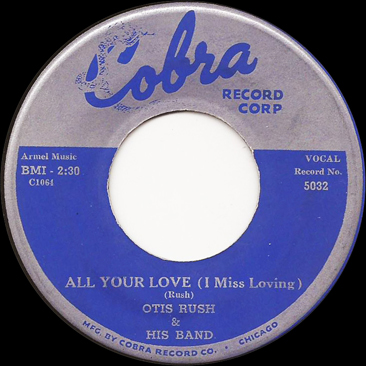
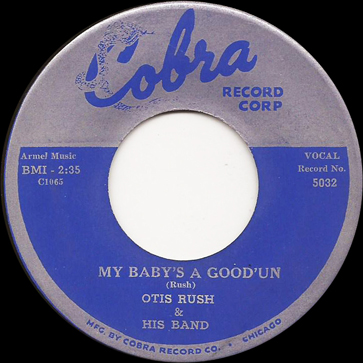
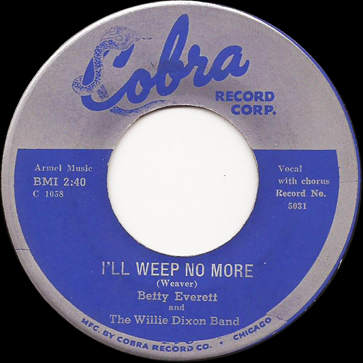
Betty Everett (voc); Ike Turner (p); unidentified (eg); Willie Dixon (b); Odie Payne (d); Tommy Hodge, Carlson Oliver, Fred Sample, Jimmy Thomas (bg voc).
Cobra Studio, Chicago, 1958
| C1058-1 [inc] | Every Day of My Life | Flyright [Br] FLY 589 | |
| C1058-3 | Every Day of My Life | Flyright [Br] FLY 589, Flyright [Br] FLYCD 39, Paula PCD-16, Fuel 2000 302 061 390 [CD] | |
| C 1058-5 | I'll Weep No More (Weaver) | Cobra 5031, Flyright [Br] FLY 589, Flyright [Br] FLYCD 39, Paula PCD-16, P-Vine [J] PCD-24050, Fuel 2000 302 061 390 [CD], P-Vine [J] PCD 18530, One Day DAY2CD204 |
Session information from Fancourt and McGrath. Flyright FLY 589, Chicago Blues with Betty Everett & Lillian Offitt, was released in Britain in 1984. Alternate takes on Flyright were most often given different titles from the released version. The alternate take is not further specified on the otherwise well annotated King Cobra CD, but there is just one complete surviving alternate in this case. P-Vine PCD-24050, Ike Turner's Kings of Rhythm: Down and Out, was released in Japan in 2001; for this session, of course, the inclusion of Betty Everett tracks makes perfect sense.
Cobra 5031 was reviewed in Billboard on April 6, 1959, and in Cash Box on April 4, 1959 (p. 52).
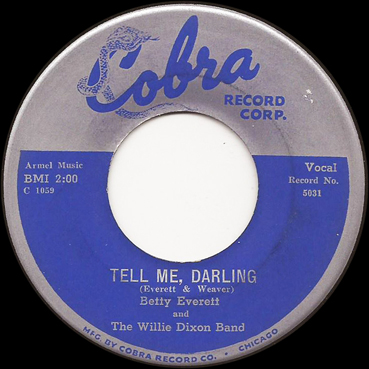
Betty Everett (voc); Eddie Jones (ts); Carlson Oliver (ts); Jackie Brenston (bars); unidentified (p); Ike Turner (eg); Willie Dixon (b); Odie Payne (d).
Cobra Studio, Chicago, 1958
| C1059-1 [inc] | Darling Tell Me | Flyright [Br] FLY 589 | |
| C1059-4 | Darling Tell Me | Flyright [Br] FLY 589 | |
| C1059-5 | Darling Tell Me | Flyright [Br] FLY 589 | |
| C 1059-6 | Tell Me, Darling (Everett & Weaver) | Cobra 5031, Flyright [Br] FLY 589, Flyright [Br] FLYCD 39, P-Vine [J] PCD 2346, P-Vine [J] PCD-24050, P-Vine [J] PCD 18530, Fuel 2000 302 061 934 [CD], One Day DAY2CD204 |
Session information from Fancourt and McGrath. However, a baritone sax is perfectly audible on "Tell Me, Darling." Flyright FLY 589, Chicago Blues with Betty Everett & Lillian Offitt, was released in Britain in 1984. P-Vine PCD 2346 is a CD released in Japan in 1992, under the title Willie Dixon: Working on the Blues, Vol. 1. Two versions of "Tell Me, Darling" were included in Paula PCD-16, Ike Turner 1958-1959, a CD released in 1993, and on Fuel 2000 302 061 390 [CD], an Ike Turner CD released in 2004 under the title King Cobra. Although King Cobra is decently annotated, the alternate take of "Tell Me, Darling" is not further specified. The same is true of Ike Turner's Kings of Rhythm: Down and Out, on P-Vine [J] PCD-24050.
Cobra 5031 was reviewed in Billboard on April 6, 1959, and in Cash Box on April 4, 1959 (p. 52).
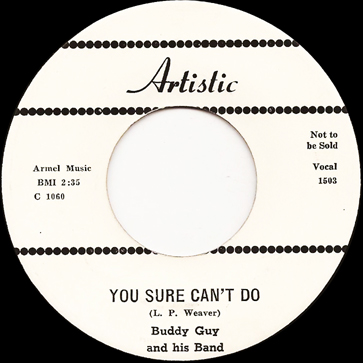
Buddy Guy (eg -1, voc); Eddie Jones (ts except -3); Carlson Oliver (ts except -3); Jackie Brenston (bars except -3); Harold Burrage (p except -3); Ike Turner (eg -2, 3); Willie Dixon (b); Odie Payne (d except -3).
Cobra Studio, Chicago, 1958
| rehearsal | You Sure Can't Do -3 | Flyright [Br] FLY 594, P-Vine Special [J] PLP-9026, P-Vine [J] PCD 2350 | |
| tk. 1-4 | You Sure Can't Do -2 | Flyright [Br] FLY 594, P-Vine [J] PCD 2350, P-Vine [J] PCD-24039 | |
| tk. 5, 6, 7 | You Sure Can't Do -2 | P-Vine Special [J] PLP-9026, P-Vine [J] PCD 2350, P-Vine [J] PCD-24039 | |
| C 1060 | You Sure Can't Do (L. P. Weaver) -2 | Artistic 1503, Red Lightnin' RL 001, Flyright [Br] FLY 582, Flyright [Br] FLYCD 18, Paula PCD-9, P-Vine [J] PCD 2350, Capricorn 9-42012 [CD], P-Vine [J] PCD-24039. P-Vine [J] PCD-24050, P-Vine [J] PCD 18531 | |
| tk. 1, 2, 3 | This Is the End -1 | Flyright [Br] FLY 594, P-Vine [J] PCD 2350, P-Vine [J] PCD-24039 | |
| tk. 4, 5, 6, 7 | This Is the End -1 | P-Vine Special [J] PLP-9026. P-Vine [J] PCD 2350, P-Vine [J] PCD-24039 | |
| C 1061 | This Is the End (Turner) -1 | Artistic 1503, Red Lightnin' RL 001, Flyright [Br] FLY 582, Flyright [Br] FLYCD 18, Paula PCD-9, P-Vine [J] PCD 2350, Capricorn 9-42012 [CD], P-Vine [J] PCD-24039, P-Vine [J] PCD 18531, Fuel 2000 302 061 934 [CD] |
Session information from Fancourt and McGrath. For the Guitar Slim knockoff, "You Sure Can't Do," Ike Turner plays the lead guitar. After "You Sure Can't Do," there can't be a whole lot of Buddy Guy recordings on which he didn't play his instrument....
Billboard reviewed Artistic 1503 on March 16, 1959. Cash Box had reviewed it on March 7, 1959 (p. 45).
Red Lightnin' RL 001 was released in 1969 under the title Buddy Guy: In the Beginning. Flyright FLY 582 was released in Britain in 1981, under the title Fishin' in My Pond: Chicago Blues Bands. P-Vine Special PLP-9026 was released in Japan in 1981, under the title Chicago Blues Session before Sunrise. The A side featured part of this session and part of the earlier session for Artistic by Charles Clark; the B side consisted of Chess and Checker material. Flyright FLYCD 18 and Paula PCD-9, Chicago Boss Guitars, both released in 1991, include one alternate take each of "You Sure Can't Do" and "This Is the End"—we don't know which. P-Vine PCD 2350, a 1992 release from Japan titled Buddy Guy, Otis Rush & Magic Sam at the Cobra Studio 1956-58, gives this entire session the warts-and-all treatment. P-Vine PCD-24039, Buddy Guy: This Is the Beginning, was released in Japan in 2001. PCD-24039 includes stretches of the session for both "You Sure Can't Do" and "This Is the End"; we don't know whether they are complete, although a 16-track CD has enough room for all alternate takes. P-Vine PCD-24050 was released in Japan in 2001 as Ike Turner's Kings of Rhythm: Down and Out The Cobra Sessions 1958-1959. The 2007 CD compilation on Fuel 2000 302 061 686, titled Treasures from the Vaults, includes a version of "This Is the End," identified only as "alternate," a fate shared by the version of "You Sure Can't Do" on the same CD.
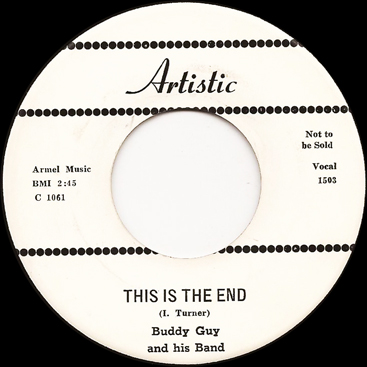
Ike Turner (eg); Fred Sample (p); Willie Dixon (b); Odie Payne (d); Jackie Brenston (voc); Tommy Hodge, Carlson Oliver, Jimmy Thomas (bg voc).
Cobra Studio, Chicago, 1958
| [tk. 1, inc] | You Keep on Worrying Me | Flyright [Br] FLY 578 | |
| [tk. 2] | You Keep on Worrying Me (Brenston) | Flyright [Br] FLYCD 39, Paula PCD-16, P-Vine [J] PCD-24050, Fuel 2000 302 061 390 [CD] | |
| [tk. 3, inc] | You Keep on Worrying Me | Flyright [Br] FLY 578 | |
| [tk. 4] | You Keep on Worrying Me (Brenston) | Flyright [Br] FLY 578, Flyright [Br] FLYCD 39, Paula PCD-16, P-Vine [J] PCD-24050, Fuel 2000 302 061 390 [CD] |
All information from Fancourt and McGrath. Nothing from this session ever appeared on Cobra, and the first release of any of it was Flyright FLY 578, Ike Turner: The Kings of Rhythm, which came out in Britain in 1981. Only one of the complete takes was used on that occasion (take 4). One of the two complete takes—we don't know which—appeared on Capricorn 9-42012 [CD]. We also don't know which complete take was used on P-Vine PCD 2161, Ike Turner's Kings of Rhythm: Cobra Sessions, 1958, which was released in 1990. Both of the complete takes are on Paula PCD-16, Ike Turner 1958-1959, a CD released in 1993. Both are on P-Vine PCD-24050, Ike Turner's Kings of Rhythm: Down and Out, released in Japan in 2001. Fuel 2000 302 061 390, King Cobra: The Chicago Sessions, identifies the takes as 2 and 4.
Ike Turner (eg); Eddie Jones (ts); Carlson Oliver (ts); Fred Sample (p); Willie Dixon (b); Odie Payne (d); Tommy Hodge (voc).
Cobra Studio, Chicago, 1958
| tk. 1 | I'm Gonna Forget about You | Flyright [Br] FLY 578, Flyright [Br] FLYCD 39, Paula PCD-16, P-Vine [J] PCD-24050 | |
| tk. 2 | I'm Gonna Forget about You | Flyright [Br] FLY 578, Flyright [Br] FLYCD 39, Paula PCD-16, P-Vine [J] PCD-24050 | |
| tk. 1 [inc] | Matchbox | Flyright [Br] FLY 578 | |
| tk. 2 [inc] | Matchbox | Flyright [Br] FLY 578 | |
| tk. 3 [inc] | Matchbox | unissued | |
| tk. 4 | Matchbox | Flyright [Br] FLY 578, P-Vine [J] PCD-24050, Fuel 2000 302 061 390 [CD] | |
| tk. 5 [inc] | Matchbox | unissued |
All information from Fancourt and McGrath. Nothing from this session saw release on Cobra; the first issue of any of it was Flyright FLY 578, Ike Turner: Kings of Rhythm, from Britain in 1981. "I'm Gonna Forget about You" and "Matchbox" are actually the same song, though apparently they were diffrerently titled on the session tapes. This "Matchbox" is called Version B on the Flyright LP.
P-Vine PCD 2161, released in Japan in 1990, was titled Ike Turner's Kings of Rhythm: Cobra Sessions, 1958. It used one take of "I'm Gonna Forget about You" and two of "Matchbox"—we don't know which. Flyright FLYCD 39 was an Ike Turner CD released in Britain in 1991; it may match the Paula CD track for track, but we need to compare them. Paula PCD-16, Ike Turner 1958-1959, is a CD released in 1993; the takes used on this CD need checking. P-Vine PCD-24050, Ike Turner's Kings of Rhythm: Down and Out The Cobra Sessions 1958-1959, released in Japan in 2001, contains a complete take of "Matchbox" from this session. It purports to contain another one (as track 6), but the baritone sax places it on the next session. Fuel 2000 302 061 390, King Cobra: The Chicago Sessions, is an Ike Turner CD released in 2004. It identifies one take of "Matchbox" as version 1, take 4; no other is identified on the CD as coming from this session. Fuel 2000 302 061 686 [CD], Treasures from the Vaults, includes one take from this session. It is labeled "alternate," which makes it anyone's guess, though the title is also give as "I'm Gonna Forget about You." Why Flyright retitled so many previously unreleased items (often these were alternate takes of titles that had been released) is unfortunately unclear.
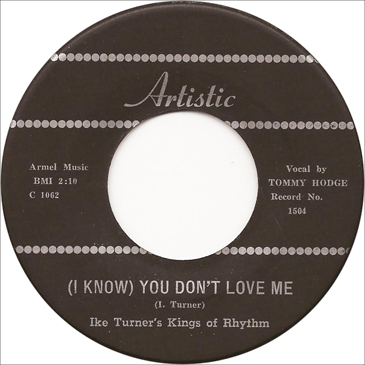
Tommy Hodge (voc); Eddie Jones (ts); Carlson Oliver (ts); Jackie Brenston (bars); Fred Sample (p); Ike Turner (eg); Willie Dixon (b); Odie Payne (d).
Cobra Studio, Chicago, 1958
| C1062-1 | I Know You Don't Love Me No More | Flyright [Br] CD 39, Paula PCD-16, Fuel 2000 302 061 390 [CD] | |
| C1062-2 [inc] | I Know You Don't Love Me No More | Flyright [Br] FLY 578 | |
| C1062-3 [inc] | I Know You Don't Love Me No More | unissued | |
| C1062-4 [inc] | I Know You Don't Love Me No More | Flyright [Br] FLY 578 | |
| C1062-5 [inc] | I Know You Don't Love Me No More | Flyright [Br] FLY 578 | |
| C1062-6 | I Know You Don't Love Me No More | Flyright [Br] FLY 578 | |
| C 1062-7 | (I Know) You Don't Love Me (Turner) | Artistic 1504, P-Vine [J] PCD 2161, Capricorn 9-42012 [CD], Flyright [Br] FLYCD 39, Paula PCD-16, P-Vine [J] PCD-24050, Fuel 2000 302 061 390 [CD], P-Vine [J] PCD 18531, Fuel 2000 302 061 934 [CD] | |
| C1063-1 [inc] | How Long (Will It Last) | Flyright [Br] FLY 578 | |
| C 1063-2 | Down & Out (Turner) | Artistic 1504, Red Lightnin' RL 006, Flyright [Br] FLY 578, P-Vine [J] PCD 2161, P-Vine [J] PCD 2346, Capricorn 9-42012 [CD], Flyright [Br] FLYCD 39, Paula PCD-16, P-Vine [J] PCD-24050, Fuel 2000 302 061 390 [CD], P-Vine [J] PCD 18531, Broadside [Br] STERN1 [CD] | |
| tk. 1 [inc] | Matchbox | Flyright [Br] FLY 578 | |
| tk. 2 [inc] | Matchbox | Flyright [Br] FLY 578 | |
| tk. 3 [inc] | Matchbox | Flyright [Br] FLY 578 | |
| tk. 4 [inc] | Matchbox | Flyright [Br] FLY 578 | |
| tk. 5 | Matchbox | Flyright [Br] FLY 578, Paula PCD-16, P-Vine [J] PCD-24050, Fuel 2000 302 061 390 [CD] | |
| tk. 6 | Matchbox | Flyright [Br] CD 39, Paula PCD-16, P-Vine [J] PCD-24050, Fuel 2000 302 061 390 [CD] |
Billboard reviewed Artistic 1504 on April 6, 1959; Cash Box had gotten to it on April 4 (p. 53). Again, the session date is more than a little unclear.
Personnel from Fancourt and McGrath. Red Lightnin' RL 006, When Girls Do It, is a 2-LP set released in 1971; the set was reissued on CD as Broadside STERN1, a British release from 2008. Flyright FLY 578, Ike Turner: Kings of Rhythm, was released in Britain in 1981. On it, this "Matchbox" is called Version A.
P-Vine PCD 2161, released in Japan in 1990, was titled Ike Turner's Kings of Rhythm: Cobra Sessions, 1958. It used two takes of "Matchbox"—we don't know which. P-Vine PCD 2346 was released in Japan in 1992, under the title Willie Dixon: Working on the Blues, Vol. 1. Either take 5 or take 6 of "Matchbox"—it is not clear which—was reissued on Capricorn 9-42012. Paula PCD-16, Ike Turner 1958-1959, a CD released in 1993, includes takes 5 and 6 from this session (which are referred to as the "B version"). Flyright FLYCD 39, the Flyright Ike Turner release from 1991, may have included these same tracks (which are the only complete takes from of this version); we are not sure. P-Vine PCD-24050, Ike Turner's Kings of Rhythm Down and Out The Cobra Sessions 1958-1959, was released in Japan in 2001; it purports to include one take of "Matchbox" and one alternate take of "I Don't Love You No More" from this session—we don't know which. In fact, track 6 is another take of "Matchbox" from this session (Brenston's baritone sax can be heard), not from the previous one. Fuel 2000 302 161 390, released in 2004 under the title King Cobra, specifies takes 5 and 6 [though it says that take 6 is of a version "3"), along with another that is just referred to as "Version 2 take ?".
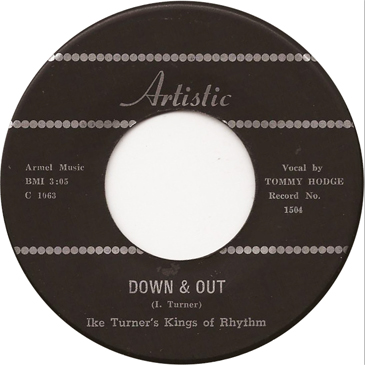
Ike Turner (p, voc); poss. Herb Sadler (eg); unidentfied (eb -1); Billy Gayles (d, voc).
Cobra Studio, Chicago, 1958
| C1066-1 | Walking Down the Aisle | Flyright [Br] FLY 578 | |
| C1066-2 [inc] | Walking Down the Aisle | Flyright [Br] FLY 578 | |
| C1066-3 | Walking Down the Aisle | P-Vine Special [J] PLP 9021 | |
| C1066-4 | Walking Down the Aisle | Flyright [Br] CD 39, Paula PCD-16, Fuel 2000 302 061 390 [CD] | |
| C1066-5 | Walking Down the Aisle -1 | Flyright [Br] FLY 578 | |
| C1066-6 | Walking Down the Aisle -1 (Turner) | Cobra 5033, P-Vine [J] PCD 2161, Flyright [Br] FLYCD 39, Paula PCD-16, P-Vine [J] PCD-24050, Fuel 2000 302 061 390 [CD], P-Vine [J] PCD 18530, One Day DAY2CD204 |
Cobra 5033 was reviewed in Billboard on July 20, 1959, and in Cash Box on July 25 (p. 105, "Award o' the Week"), making it the company's next-to-last release.
Fancourt and McGrath make it appear that Ike Turner and Billy Gayles played all the instruments. In fact, "Walking" as released includes electric guitar, piano, electric bass, and drums. Take 4 does seem to be restricted to piano and drums. F and M put the recording date in 1959, but no reason is stated for this. The session is unusual in its employment of Turner's regular drummer instead of Willie Dixon's preference, Odie Payne. The release is unusual because Cobra had not previously deferred to jukebox operators who wanted 2-minute sides. On Cobra 5033, each side times in just under 2:00.
In July 1959, Turner and band were recording again, in Saint Louis, for the Stevens label. The employment of a not very concealing name, "Icky Renrut," on his two Stevens singles suggests that Turner's contract with Cobra hadn't run out. For his next label, Sue, Turner used his real name.
Flyright FLY 578, Ike Turner: Kings of Rhythm, appeared in Britain in 1981. P-Vine PCD 2161, released in Japan in 1990, was titled Ike Turner's Kings of Rhythm: Cobra Sessions, 1958. It also used an alternate take of "Walking Down the Aisle"—we just don't know which one. The same is true of Flyright FLYCD 39, the British Ike Turner release from 1991. Paula PCD-16, Ike Turner 1958-1959, is a CD released in 1993. P-Vine PCD-24050, released in 2001, also uses an unspecified alternate take of "Walking Down the Aisle." Fuel 2000 302 061 390, King Cobra: The Chicago Sessions, is an Ike Turner CD released in 2004.
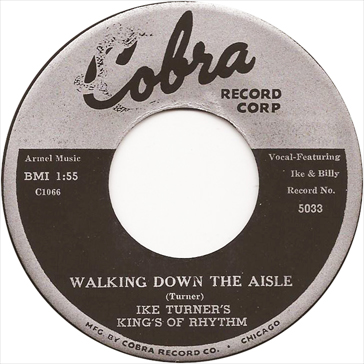
Ike Turner (eg); Fred Sample (p); Willie Dixon (b); Odie Payne (d); Jackie Brenston (voc).
Cobra Studio, Chicago, 1958
| tk. 1 | You've Got to Lose (Brenston) | Flyright [Br] FLY 578, Flyright [Br] FLYCD 39, Paula PCD-16, P-Vine [J] PCD-24050, Fuel 2000 302 061 390 [CD] | |
| tk. 2 | You've Got to Lose (Brenston) | Flyright [Br] FLY 578, Flyright [Br] FLYCD 39, Paula PCD-16, P-Vine [J] PCD-24050, Fuel 2000 302 061 390 [CD] |
All information from Fancourt and McGrath. Nothing from this session saw release on Cobra. The initial release was on Flyright 578, Ike Turner: Kings of Rhythm, in 1981. A version of "You've Got to Lose"—it's not clear which—appeared on Capricorn 9-42012 [CD]. Paula PCD-16, Ike Turner 1958-1959, is a CD also released in 1993; P-Vine PCD-24050 is an Ike Turner Cobra collection released in Japan in 2001; Fuel 2000 302 061 390, King Cobra: The Chicago Sessions, is an Ike Turner CD released in 2004. The Fuel 2000, one of the better annotated Cobra reissues, includes two takes of "You've Got to Lose" and says that they are unidentified. But there are just two possibilities here. Fuel 2000 302 061 686, a 2007 compilation on CD titled Treasures from the Vaults, includes one take of "You've Got to Lose"; unhappily, this is merely, and uselessly, identified as "alternate."
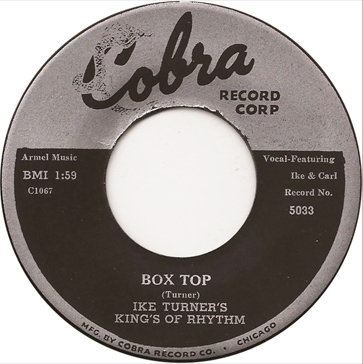
Ike Turner (eg, voc); unidentified (p); Willie Dixon (b); unidentified (d); Carlson Oliver (voc); Tommy Hodge (voc).
Cobra Studio, Chicago, 1958
| C1067 | Box Top | Cobra 5033, Flyright [Br] FLY 578, Capricorn 9-42012 [CD], Flyright [Br] FLYCD 39, Paula PCD-16, P-Vine [J] PCD-24050, Fuel 2000 302 061 390 [CD], P-Vine [J] PCD 18530, One Day DAY2CD204 |
Cobra 5033 was reviewed in Billboard on July 20, 1959, making it the company's next-to-last release. It was reviewed in Cash Box on July 25 (p. 105).
Flyright FLY 578 was an LP released in Britain in 1981, under the title Ike Turner: Kings of Rhythm.
By our estimate, Cobra recorded around 80 surviving tracks in 1958. The proportion of unreleased material was higher. And releases were spread out, to buy time for a company that was faltering. In 1958 there were just 9 new singles on Cobra (5021 through 5029) and 4 on Artistic (100 and 1500 through 1502). 1959 saw the last 4 releases on Cobra (5030 through 5033) and the last 2 on Artistic (1503 and 1504).
Howard Bedno, who occasionally surfaced in the trades (Cash Box complimented him on his new suit, January 12, 1957, p. 30) left the company around the end of 1958. In July 1959, he was working for Chess (see, for instance, "Chess Pacts Casper," Cash Box, July 25, 1959, p. 83; Bobby Casper, having been signed to Argo, was now under the management of "Howard Bednoe [sic], of the Chess promotion department").
Eli Toscano showed up one more time in Cash Box. The American Record Manufacturers and Distributors Association (with Ewart Abner and Sam Phillips among its officers) met in Chicago June 7 through 9. Cash Box ran a spread of photos from the ARMADA event, one which showed Toscano coming in the door with Bobby Robinson of Fury and Fire Records. Unfortunately, the photo (Cash Box, June 27, 1959, p. 42) wasn't reproduced very well in the copy we have seen.
After Cobra went out of business, Richard Stamz (1905-2007), then riding high as a DJ on WGES, took over the complex at 3346 West Roosevelt Road. Most likely this was in 1960. Stamz, who had been interested in breaking into the record business, had played some role at Abco and also been around during the Cobra years, though the nature and extent of his involvement in either company remain unclear. He reportedly also used the old Cobra studio—how often we don't know—for his new operation. Stamz operated the Paso, Fox, Foxy, Dawn, Shorty-P, and Halo labels through 1963, leaving radio work in 1964. How much contact he had with Toscano after 1959 we also don't know; when interviewed years later by Patrick Roberts, Stamz claimed that Toscano named the Paso label—but he also retold the legend about Toscano being whacked in 1959. We do know that Stamz reissued one Magic Sam single (Cobra 5013) on his Fox label, in 1961.
Both Buddy Guy and Otis Rush moved over to Chess. Guy cut his first session for the Chess brothers on March 2, 1960, remaining with them for the next 7 years. Guy's years with Chess were frustrating from an artistic standpoint; during this period, he snuck out to Delmark, where as "Friendly Chap" he cut two albums with Junior Wells in 1965 and 1966. Guy finally secured his place in the blues pantheon in late 1980s; an internationally celebrated musician, he remains active today.
Rush started earlier with Chess, in January 1960, but failed to pull in comparable sales and was with the label for just one year. In 1962, he did one session for Duke. He made an LP for Vanguard in 1965 and one for Cotillion in 1969, but Rush continued to have an up-and-down career until the mid-1980s, when he finally got worldwide recognition as a top blues artist. Otis Rush retired from performing when he suffered a stroke in 2004. Otis Rush died from complications of another stroke on September 29, 2018. He was 83 years old.
Walter Horton went through a down period, as far as recordings were concerned, after his one session for Cobra. But his opportunities increased during the 1960s blues revival and he remained active until 1980. Walter Horton died of heart failure in Chicago on December 8, 1981.
Harold Burrage's first Vee-Jay single was probably recorded in late March of 1959 and released in July. He then made a move into soul music, recording first for Richard Stamz' Paso and Foxy labels, then moving to One-derful!, where he finally scored a national hit in 1965. Harold Burrage died in Chicago on November 26, 1966, aged just 35. His son Ronnie became a well-known jazz drummer.
Little Willie Foster did not record again after his one session for Cobra. He had to retire from performing after suffering a gunshot wound.
Magic Sam was drafted into the Army, which led to a rapid dishonorable discharge. Rebounding, he went to Mel London's Chief label during 1960-1961 and Lawyer Burton's Crash label in 1966. He scored a breakthrough when he made his West Side Soul LP for Delmark later that same year. Delmark would subsequently record him a second time in the studio and release several live sessions, including some from earlier years. But Sam had hardly any time to enjoy his fame; he died of a heart attack in Chicago on December 1, 1969, aged only 32.
Betty Everett spent some time with two small local labels, C. J. and One-derful!, before landing at Vee-Jay, where she scored hits in 1963 and 1964. She died on August 19, 2001, in Beloit, Wisconsin.
Ike Turner was back in St. Louis in July 1959, recording as "Icky Renrut," but in 1960 a number featuring Anna Mae Bullock, who at the time was the girlfriend of tenor saxophonist Raymond Hill, was picked up by Sue Records under the made-up name "Tina Turner," and "I'm a Fool in Love" became a big hit. Wealth and fame ensued, until Tina left Ike in 1976. Having developed a serious cocaine habit, Ike Turner hit bottom on several occasions during his last three decades, including 18 months in prison during 1990-1991. By 2005, the year of his last public performances, he was seriously ill with emphysema. He died in San Marcos, California on December 12, 2007.
Reissue activity for Cobra material began while Eli Toscano was still on the scene. First, Mel London put Cobra 5000 back out as Chief 8000. Then Richard Stamz reissued Cobra 5013 as Fox 5013. Between 1961 (when the Fox single was released, with publisher credits still going to Armel) and 1964, Toscano sold his house music publisher to Jimmy Bracken of Vee-Jay. A small Vee-Jay spinoff called Vivid released three different Cobra-derived singles in 1964—one by Shakey Jake and two by Harold Burrage, who was also briefly a Vee-Jay artist. They all carried credits to Conrad Music, which was Vee-Jay's house publisher. In 1965, a Boston operation called Bluestown, through a direct deal with Toscano, redid two Otis Rush singles.
Eli Toscano died on September 21, 1967, in a boating accident. According to a brief item in the Chicago Tribune for September 23, Toscano, whose home address was given as 3333 Evergreen Street, "drowned in the Fox River south of the McHenry Dam Thursday night as he attempted to start the motor on his boat." The Southern Illinoisan for September 22 added that he was seen falling backwards into the river while working on the motor. His body was recovered by local firemen after they dragged the bottom. Eli Toscano was 43 years old. He had a gambling habit and liked to boast about the wise guys he knew, but the story that he was the victim of a mob hit—still given wide currency today—is pure mythology.
Exactly when the remains of the company passed to Stan Lewis is unclear after all these years. Lewis claimed (in a brief interview with Diana Reid Haig that was included in the Capricorn booklet) that Toscano made a quick sale to him, at a date Lewis could not remember, and Lewis never saw Toscano again. But the two Blue Horizon LPs, which were released at the end of 1969, credit Jimmy Bracken and Al Smith for assistance, and make no mention of Stan Lewis. (For that matter, they make no mention of Eli Toscano...) Lewis's ownership of JOB, USA, and Cobra/Artistic was mentioned in Living Blues #20 (March-April 1975), which makes us wonder just when the purchase took place—and who the seller actually was. Joe Brown had already dealt most of JOB to Lewis in 1972; Lewis had also picked up Abco, though whether he got it with JOB, with Cobra, or in a third transaction, is unknown.
Be that as it may, subsequent reissue activity, which began in 1980, was done through Lewis's licensees, Flyright in Britain and P-Vine Special in Japan. The discographical heavy lifting was done by Flyright, which cited articles in Living Blues on the back of nearly every Cobra-derived LP and even on occasion consulted directly with musicians who had played on some of the sessions. The Flyright series began with FLY 560 in 1980 and ended with FLY 594 in 1984.
During the CD era, which for this material started in 1989, Flyright and P-Vine were joined by Lewis's own Paula label. Paula typically repeated Flyright CD issues with the same cover art, graphics, and discographical information; meanwhile P-Vine continued producing its own series. The Capricorn set, from 1993, was the result of a one-time deal.
After Lewis retired from the record business, around 2000, Cobra and Artistic material passed to Westside in Britain and Fuel 2000 in the US, while P-Vine in Japan relicensed what it had. Flyright and Westside are now both out of business, but Fuel 2000 has continued repackaging Cobra tracks in varying combinations, and P-Vine put together its Cobra/Abco box in 2008.
Our thanks to Dr. Robert Stallworth for providing scans of nearly every Cobra and Aristocrat 45-rpm label, to Helge Thygesen, Don Kochakian, Steve Dikovics, and Bob Leszczak for scans of 78s and 45s from their collections, and to George White and Victor Pearlin for help with references to Galen Gart's First Pressings for the period.
The many Cobra-derived reissue packages go back to 1969, when the Blue Horizon Otis Rush and Magic Sam LPs were compiled. Both of these made a preliminary effort to cover alternate takes, and the Magic Sam LP marked the first release of his instrumental "Magic Rocker." The LP on Japanese Epic was a straight reissue of the Otis Rush album.
The Flyright LPs, in a series that ran from Flyright FLY 560 in 1980 to FLY 594 in 1984, sorted out the remaining alternate takes of Otis Rush and Magic Sam. Bruce Bastin of Flyright and his various collaborators did the discographical heavy lifting, which included four years of requests to Stan Lewis for additional takes. However, the P-Vine Special LPs mostly came out in the same years as their counterparts on Flyright, and some of the "new" items came out first on P-Vine. Neither Flyright nor P-Vine showed any interest in the Cobra doowop groups, in Gloria Irving, Duke Jenkins, or the Rock-a-Beats. Material of blues relevance was given exhaustive coverage, leading to the issuance of the Big Joe Williams and Memphis Slim tracks, the recovery of the Sonny Boy Williamson tracks, and the thorough exploration of the Clarence Jolly, the Guitar Shorty, and the Lee Jackson sides, plus the release of alternate takes on Shakey Horton, Sunnyland Slim, Charles Clark, and Buddy Guy. Flyright gave Harold Burrage a whole LP and Ike Turner a whole LP, while P-Vine split the difference and made them share one (Ike Turner material got heavier emphasis on the P-Vine CDs).
The third reissue wave began in 1989, in response to the advent of CDs. Both Flyright and P-Vine put out CDs on the artists they had already covered, while Stan Lewis put out CDs in the United States on his own Paula label (generally these copied the Flyrights but followed with a year or two delay).
Capricorn 9-40212, The Cobra Records Story: Chicago Rock and Blues 1956-1958, a 2-CD box set that was released in 1993, has been particularly helpful, on account of the interview material and the photos included in the booklet. The first to include anythng by Duke Jenkins, the Capricorn box was the product of a special deal with Stan Lewis.
Around 2000, Lewis dealt his holdings to EMusic.com. P-Vine signed up for a new license, while Fuel 2000 got the rights in the United States and Westside took over in Great Britain. A fourth wave of reissues began in 2001, but these largely replicated what had already appeared on P-Vine, Flyright, and Paula. Westside went broke, but Fuel 2000 (now part of Universal Music) and P-Vine have sporadically produced other reissue packages.
The most comprehensive Cobra/Artistic reissue package to date (it does not include alternate takes, but it throws in both sides of 8 Abcos for good measure) appeared in Japan in 2008: The Complete Cobra Singles, 4 CDs on P-Vine Special PCD 18528/31. This, unfortunately, is nearly impossible to obtain anywhere else. It does seem to have stimulated the inclusion of Duke Jenkins, Gloria Irving, and Rock-a-Beat tracks on subsequent reissues.
A 2013 compilation, Double Trouble: The Cobra Records Story (One Day DAY2CD204), contains 40 tracks, not including any Artistics, and gives more attention to the neglected artists. However, certain items have been skipped over in every reissue other than the P-Vine box from 2008: the ballad sides by Gloria Irving and Duke Jenkins, "Bonnie" by the Rock-A-Beats, and Artistic's only gospel record, by the Reverend Robert Ballinger.
Click here to return to the Red Saunders Research Foundation page.
Click here to return to Robert L. Campbell's Home page.